THINKING ALOUD




























ISSUE APR - JUN 2023 22 A QUARTERLY MAGAZINE publication of rehoboth dream solid foundation (rdsf)
Dr. Folasade Hunsu

Department of English, Obafemi Awolowo University, Nigeria
Mr. Patrick Edebor
Editorial/publishing consultant. Owner, Patrick Edebor and Associates.
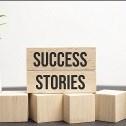


Mr. Akin Adejuwon
Curator, Institute of Cultural Studies, Obafemi Awolowo University, Ile-Ife.

Mr. Rotimi Lawuyi FCA
Owner, RAMA Editors.
Dr. Mrs Olayinka Opadiya

Senior Pastor, Every Nation Church Sydney Australia.
Mrs. Abimbola Komolafe
Founder/Executive Director, Rehoboth Dream Solid Foundation.


Rear Admiral (Rtd) Oladeinde Joseph, Chairman, Board of Trustees
Pharm. Samson Igbokwe
Mrs Roseline Igbokwe
Mrs Ronke Osikoya
Ms Ketumi Alasa
Pastor (Dr) Joshua Opadiya
Dr (Mrs) Yinka Opadiya
Mrs Abimbola Komolafe
Rear Admiral (Rtd) K O Komolafe
Editor
Bimbo Komolafe

Publication & Design
Benjamin Eze
Project Manager
Tomi Olatunde-Idowu

Project Team
Edison Egere
Othniel Komolafe
Grace Adoga

Celestina Osiki
Dorcas Adekunle


Amarachi Uduma
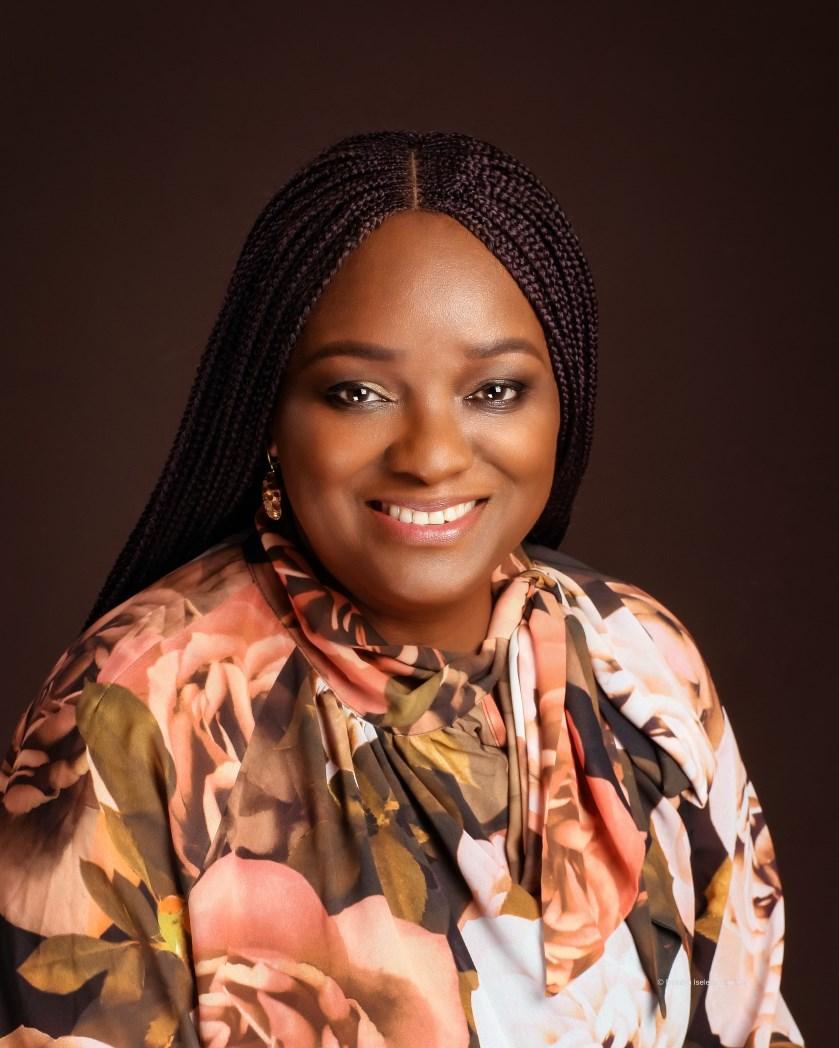
THINKING ALOUD ISSUE 22 | APR - JUN 2023 | 2 @2023. Thinking Aloud Magazine, a publication of Rehoboth Dream Solid Foundation. All rights reserved. No part of this publication may be reproduced, distributed, or transmitted in any form or by any means, including photocopying, recording, or other electronic or mechanical methods, without the prior written permission of the publisher, except in the case of brief quotations embodied in critical reviews and certain other non-commercial uses permitted by copyright law.
Cover Photo: Mrs Toyin Omozuwa
R D S F
CONTENTS
Bimbo Komolafe Editor


Dearreaders,

In today's rapidly changing world, the power of collaboration and support among women has become more evident than ever. In our cover story, we explore the remarkable journey of Mrs. Toyin Omozuwa, Founder of the Women SupportingWomen(WSW)network , an inspiring community that has been transforming the lives of women worldwide. She shares with our readers the numerous ways the WSW network has been a beacon of hope and inspiration. The interview is loaded and reminds us that people can accomplish more together when they support one another,irrespectiveofgender.
Stroke is a serious and often life-altering medical condition that affects millions of people worldwide. In one of our health articles, award-winning neurologist, Dr Niyi Borire delves into the intricacies of stroke, shedding light on its symptoms, risk factors, preventive measures, and avenues for recovery. You will also enjoy reading our second health article titled ‘FacialKeloidScar:AnAestheticEnigma ’ by Dr. Oluseyi Ibukun-Obaro, a Consultant Oral and MaxillofacialSurgeonwithNationalHospitalAbuja.
We are pleased to bring you another encouraging success story from the work done by the Rehoboth Dream Solid Foundation (RDSF). Omolola Mariam Kolawole recently graduated from university, acquiring a Bachelor of Technology inAgriculturalEconomicswithaCGPAof4.42/5.00.RDSFisproudto havebeenapartofherstory.
The fitness spotlight is on Mrs ‘Yemisi Ayeni, former Managing Director of Shell Nigeria ClosedFund Administrator Limited,andwearedelightedtoshareherfitness regimewithourreaders.

Investing in rental properties can be a lucrative endeavour, but it comes with its fair share of challenges. In this edition, our finance article explores valuable tips to help landlords protect their properties and navigate the complexitiesofearningincomefromrealestateinvestments.
On a sad note and with heavy hearts, we share the sad news of the passing of one of our esteemed pioneer trustees, Mrs. Roseline Igbokwe. It is with deep sorrow that we bid farewell to a remarkable individual who played a pivotal role in the success and growth of our organization. The Trustee’s corner in this edition is dedicated to her memory. Pleaserememberherfamily,friends,andthe entireRDSFcommunityinyourprayers.
Dohaveapleasantreadingexperienceandremembertosharethismagazinewithyourfamilyandfriends.

3 A QUARTERLY MAGAZINE
connect with us on social media thinkingaloudmagazine R D S F
EDITORIAL
Modern Day Parenting TIPS TO PARENTING RIGHT IN AN INTERNET DRIVEN WORLD
by Amarachi Uduma
SEVENTIPSTOPARENTING RIGHTINANINTERNET DRIVENWORLD
1. Use Appropriate Parenting Style: There are several parenting styles, such as authoritative, permissive, and authoritarian. What kind of parent are you? According to research, the authoritative parenting approach, which combines warmth with defined expectations and consistent discipline, appears to be linked to positive outcome for children. The most effective parenting style, however, is one that fosters a healthy, positive relationship between parent and child and assists the child in developing into a adjustedadult.
Parenting has always been a challenging activity, especially in this era of technology and social media, it can feel like navigating an everchangingenvironment.
Deciding which parenting strategies are best for bringing up happy, healthy, and well-adjusted children is tasking, even with the abundance of information and advice at our fingertips.

Today's parents encounter new challenges and opportunities that older generations did not have, this implies that modern-day parenting generally requires a different approach than what has previously worked. Technology is an indispensable aspect of modern life, and it
has unquestionably altered the way parents raise their children, both positivelyandnegatively.
‘Cocomelon’ is a household name, even though adults do not watch it, guess who the viewers of Cocomelon are… babies! This is a clear indication that the internet is here to stay, children are introduced to the internet even from toddler age, and the best we can do is to find ways to leverage on the positive consequences and combat negative consequencesthatfollow.
In this article, we will look at a few of the methods we may adopt to modify our parenting methods to best meet the needs of our children inthisrapidly-changingworld.
2. Establish Limits: In today’s world, it is not unusual for children, especially young teenagers, to have phonesandsocialmediaaccounts.As parents, it is essential to set and continuously enforce clear limits on screentime.
This entails establishing restrictions on how much time your child may spend online each day, as well as the hours of the day they are permitted to use gadgets. It is also advisable to establish guidelines for the kinds of online content your child is permittedtoaccess.
“
The most effective parenting style, however, is one that fosters a healthy, positive relationship between parent and child and assists the child in developing into a happy, well-adjusted adult.”

THINKING ALOUD ISSUE 22 | APR - JUN 2023 | 4
R D S F
help you better understand their online activities and keep them safe. Ask them about the websites they visit and the content they consume. Consider playing online games or watching videos with your child to better understand their interests. Follow them on social media accounts if you can, and engage their content, it helps to keep them accountable.
4. Monitor Internet Activity: The internet makes explicit information very easily accessible, it's crucial to maintain track of your child's online activities if you want to keep them safe. This involves keeping an eye on the apps they use, the websites they visit, and the contacts they make. You can maintain tabs on your child's online activity with a range of parental control software applications and monitoring apps that are available.
“Consider playing online games or watching videos with your child to better understand their interests. Follow them on social media accounts if you can, and engage their content, it helps to keep them accountable.”

to keeping your child safe online is to teach them about online safety and responsible internet use. This involves talking about issues like internet predators, cyberbullying, and the significance of securing personalinformationonline.
6. Model Responsible Internet Use: Children generally learn by imitation, so it's vital to set a good example for them. Avoid overusing your phone or computer in front of your kids, and serve as an example of appropriate online conduct by respecting others' privacy and refraining from cyberbullying.
life beyond the internet. Promoting offline activities like outdoor play, reading, and spending time with friends and family will help your child strike a healthy balance between online and offline activities. Also, it may encourage your children to pursue interests and social skills outsideofthe virtualworld. Remember, parenting in the digital age is a constantly evolving process. It's important to stay informed, be flexible, and adjust your approach as needed to ensure your child's safety and well-being both online and offline.

5 A QUARTERLY MAGAZINE
R D S F
ESSENTIAL TIPS FOR LANDLORDS IN NIGERIA
with its fair share of challenges. In this article, I will explore valuable tips to help landlords protect their properties and navigate the complexities of earning income from real estateinvestments.

The article will highlight some mistakes Landlords make that place them at the mercy of tenants. Before delving into the article, it is important to recognize the potential risks that come with being a landlord.
There are many risks with letting out one’s property; from nonpayment of rent, and property damage, to outright claim of owning the property. It is important to be preparedand proactive to ensureyou get desired rental income without unnecessary hassles or destruction of yourproperty.
your rental income is by conducting comprehensive tenant screenings. This includes background checks, verifying income and employment, andcontacting previouslandlords.
Selecting responsible and reliable tenants can significantly reduce the likelihood of rent defaults or property damage. This is the most important consideration in taking a tenant. DO NOT accept any tenant on face value (i.e. on how he has packagedhimself).
The most responsibly ‘packaged’ personality can turn out to be the complete opposite of who or how he has projected himself to be. DO NOT make your judgment on the basis of his profession, expecting him/her to be a responsible tenant. DO NOT use yourself as a yardstick thinking/expecting the prospective
As far as this rule is concerned, start by assuming the worst and do your investigations to eliminate such defective character traits. DO NOT use the information provided on forms, DO reach out and speak with asmanyreferencesaspossible.
DO independent checks to confirm their character, especially from people who related with them in recent times. It may seem onerous and time taking, however, by investing time and effort into proper tenantscreening,landlordscanavoid the pain and costs associated with renting property to irresponsible andreckless tenants.
2. Stay informed and Execute Secure Lease Agreements. As a landlord, it is important that you stay up to date with tenancy laws regarding the locationofyourproperty.

THINKING ALOUD ISSUE 22 | APR - JUN 2023 | 6
R D S F
Be reasonably aware of your rights and duties as a landlord and ensure to have a water-tight lease agreement that includes these. A strong and well-crafted lease agreement is an essential tool for safeguarding your rental income. It should clearly outline the terms and conditions, including rent payment due dates, consequences for late payments, and maintenance responsibilities.
Consult with a legal professional to ensure your lease agreement is enforceableandcoversallnecessaryareas. DO NOT compromise on this requirement. No matter how desperate you or the prospective tenant is, take a cue from what happens in the Western world, DO NOT give the keys to the tenant until a clear, agreed, and signedlease contract has been duly executed. Protect yourself against emotional blackmail; remember your property is not the only option the prospective tenant has. Don’t feel guilty when you insist on this step before allowing occupancy. If you skip or defer this step, you will be at the mercy of the tenant once he moves in as you cannot unduly evict on the basis of disagreementsovertheleaseterms.
3. Regular Property Inspections. Maintaining regular property inspections is essential for preserving the value of your property. It also helps you identify any potential issues early. When you proactively address maintenance concerns, you can preventsmall problems from escalatingintocostlyrepairs.
Additionally, inspections provide an opportunity to assess the property's condition and ensure tenants are adhering to lease terms. DO include the terms of inspection in the lease agreement and ensure your tenant understands and is ready to abide by this.
4. Adequate Insurance Cover. Insurance is important and can serve two purposes; to provide cover for possible property damage and to protect your rental income. During period of temporary vacancy, insurance can provide a respite. Though insurance
premiumswillreduce yournetrental income, it is a wise investment to insure your property. Consult with an insurance professional to assess your specific needs and obtain appropriatecover.
If your property is in a mini estate, encourage other owners to consider taking insurance to enable the ownersaccessdiscountedpremiums. While insurance is important for all types of buildings, it is crucial for flats, terraced buildings, and closely builtstructures.
5. Establish Emergency and Maintenance Funds. Creating an emergency fund specifically for your rental property can provide a financialsafety net during unexpected situations such as a major repair or a period of temporary vacancy, having funds set aside can help cover costs and ensure a consistent rental income. As a landlord, pay attention to renovating and repairing the property between occupants – i.e. once a tenancy is over, refresh and renovate as this will preserve the property and also attractcompetitiverent.
DO NOT spend all the rent received without setting aside some funds for repairs. Pay attention to painting, plumbing, and electrical wiring as these often result in expensive replacements when ignored. In a place where work done by handymen is not properly regulated, you may include in the lease agreement clear instructions on the standard of vendorstobeusedwhennecessary.
6. Consider the use of Professional Property Managers. Using a property management company offers numerous benefits when leasing out properties in Nigeria. It provides expertise in tenant acquisition, screening, rent collection, maintenance, legal compliance, tenant communication, and industry knowledge. By hiring a property management company, landlords can enjoy efficient operations, reduced stress, and enhancedreturnsontheirinvestments.
Property management companies have robust tenant screening pro-
cesses in place reducing the risk of problematic tenants. They can conduct thorough background checks and reference verifications to select reliable and responsible tenants. They are also more experienced to handle rent collection and enforce lease agreements. As a Landlord, DO NOT short-change yourself by looking at the short-term impact of the property managers’ fees but DO consider the long-term benefits of the stress they will take off your hands. DO engage reputable property management companies who can ensure that the property and lease agreements comply with legalrequirements,reducingtherisk of legal disputes or non-compliance. Landlords who engage managers for their properties can focus on other investments or personal commitments while knowing their property isprofessionallymanaged.
7. Create an inventory as an addendumtoleaseagreement.
There are numerous benefits of maintaining an inventory when leasing out properties in Nigeria. These benefits include proper documentation, dispute prevention, protecting the landlord's investment, facilitating move-in and move-out processes, promoting tenant accountability, streamlining maintenance/repairs, and assisting with insurance purposes. By having an inventory, landlords can safeguard their property, maintain transparent relationships with tenants, and effectively manage their leased properties. In addition to this, consider taking pictures andrecording a video of the state of the property at the commencement of the lease tenor. These will be very useful at the end of the lease tenor to ensure your property is returned in a goodstate.
8. DO NOT leave a non-paying tenant in your property. It is important for landlords in Nigeria to address non-payment issues promptly and take appropriate actions to protect their interests. This may involve legal recourse, seeking professional advice, and maintaining clear communication with the tenant. There are many dangers of ignoring
7 A QUARTERLY MAGAZINE
R D S F
and leaving a non-paying tenant in your property. As bizarre as it may sound, there are real-life examples where defaulting tenants have tried to fraudulently take over ownership of rented properties. In other circumstances, they have colluded with property grabbers to move in and fraudulently take over the property.
This risk is more pronounced when the landlord lives abroad or is not physically present in the same location as the property. No matter how comfortable or kind you are, remember a defaulting tenant is an investment risk, and as a minimum DO STAY in touch with the tenant asserting your ownership and demanding rent payment. DO NOT IGNORE a non-paying tenant at all. DO NOT say, ‘they will go when theyareready’.
9. Ensure you have the required government documents to prove you own the property. In Nigeria, several legal documents are commonly used toproveownershipofaproperty.
The specific requirements and procedures may vary depending on the state or location but there are some generally considered necessary legal documents for proof of propertyownership.Theseinclude:
a) Certificate of Occupancy (C of O): This document is issued by the state government and serves as proof of ownership for land or property. It is obtained through the relevant state land registry or ministry of lands and signifies that the property has been legally acquired and a lease granted to the owner by the government.
b) Deed of Assignment: This document is a written agreement that transfers ownership rights from one party to another. It is commonly used for the sale or transfer of land or property and must be executed by both the seller (assignor) and the buyer (assignee) in the presence of witnesses.Thisdeedofassignmentis deemed binding after approval from appropriategovernmentagency.
Other documentation includes Survey Plan, Building Plan Approval, and Purchase Receipt or Agreement. This means that making financial payments for the acquisition of a property is one step out of numerous steps in establishing and taking full ownership of landed property in Nigeria. This is one mistake many investors make. Transfer of money IS NOT sufficient to prove ownership. My recommendation is that prospective investors should work with experienced professionals when buying property. DO NOT rush to pay money until you have done due diligence to ensure that the seller is the legal owner of the property under consideration. There is a big risk of losing your payment if you transfer funds before you obtain and examine the legal documents. If you initiated a purchase transaction and have transferred money without documents, begin to pursue the documents immediately. Remember you can only give what you have. If your ownership is not established, you cannot bequeaththe property.
10. Minimizing Personal Attachments. Real estate investors in Nigeria seeking to maximize returns and minimize risks must emotionally detach from the leasing process and view the property as an investment rather than a charity project or personal asset. This will allow the landlord focus on commercial terms of leasing. Emotional decisions, such as renting to friends or family without proper evaluation, can pose financial risksandstrainrelationships.

Taking a business-oriented approach helps protect the investment and maintain professionalism throughout the leasing process. Landlords who become emotionally entangled in whatever form will find it challenging to make necessary decisions objectively. This includes setting appropriate rental rates, enforcing lease terms, and addressing maintenance issues promptly. Emotional attachment can cloud judgment and potentially lead to suboptimal choices that ultimately affect the landlord'sfinancialwell-being.
“Being a landlord in Nigeria requires diligence, preparation, and a proactive approach. By implementing these tips, landlords can minimize risks, protect their rental income, and maintain successful and profitable rental properties.”
Conclusion
Being a landlord in Nigeria requires diligence, preparation, and a proactive approach. By implementing these tips, landlords can minimize risks, protect their rental income, and maintain successful and profitablerentalproperties.
Generally, thorough tenant screening is vital for landlords and must not be casually handled. This is because it is fundamental to securing reliablerentalincomeand protecting their property. Implementing all the suggestions in this article will require intentionality and some effort. Still, it will be a valuable investment that pays off in the long run, providing peace of mind and financial gains forlandlords.
THINKING ALOUD ISSUE 22 | APR - JUN 2023 | 8 R D S F
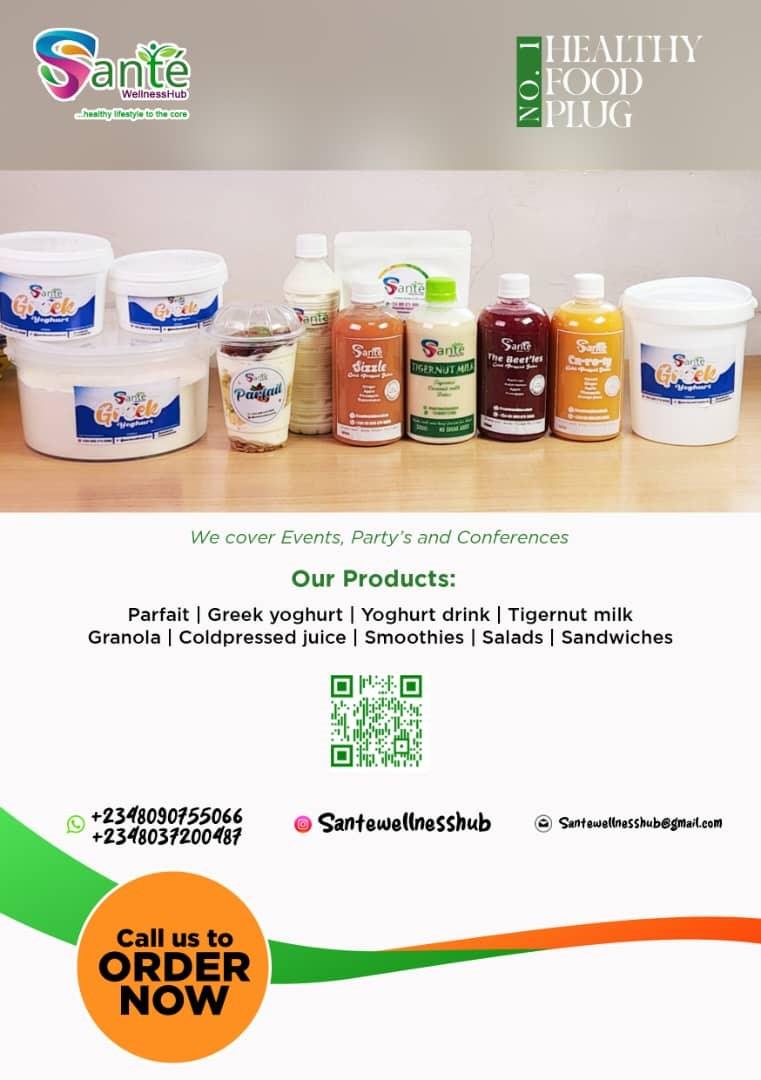
WHY TALK ABOUT STROKE?
by Niyi Borire MBBS FRACP PhD
A useful acronym for recognising the earliest symptoms of stroke is:
“FAST.”
• Face:Thefacemaydrooponone side
• Arm:Thearmmaybeweakor numb.
• Speech:Thepersonmayhave troublespeaking
• Time:Ifyounoticeanyofthese strokesigns,immediatelyvisit thenearesthospital.
Time is important because the effects of stroke depend on how quickly treatment is administered. The quicker treatment is administered, the better the chances of recovery.
WhatcausesStroke?
The risk factors for stroke are broadly divided into modifiable and non-modifiable risk factors. The modifiable risk factors are the ones you can control, while the nonmodifiable ones are beyond your control.
cause of death and is also largely implicated in most disabilities. In the last half-century, the incidence of the disease has doubled, especially among low and middle-income countries. Stroke has no socioeconomic group; it affects the rich and poor; it does not matter whether you areinaruralorurbanarea.
In fact, there is said to be 1 in every 1,000 people suffering from stroke in Nigeria, and the fatality rate is as high as 40%. It has also been shown that about 100,000 Nigerians suffer from Stroke yearly. Hospital-based studies in Nigeria state that stroke is the leading reason for neurological admissions, accounting for over 60% ofpresentingcases.
The economic and financial burden that stroke imposes on its victim has been noted to be a major challenge, especially in developing countries like Nigeria, as it has been shown that it requires an average of N95,100 ($600) and N767,900 ($4,860) in a government and a private hospital, respectively, to access care within the first 36 weeks of post-stroke affectation in Nigeria,
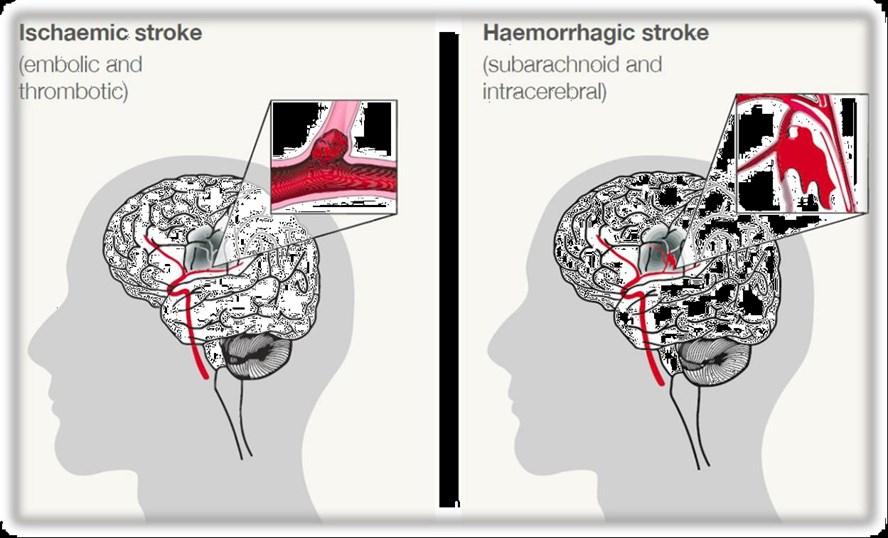
rehabilitation even among survivors ofstroke.
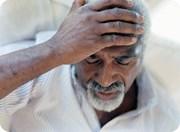
WhatisStroke?
Stroke is an insult to the brain that results from the lack of adequate blood flow. It occurs when a part of the brain dies because it is deprived of blood for too long. Blood supply to the brain can be cut off because an artery in the brain gets clogged or closes off (ischaemic stroke) or an artery in the brain starts bleeding (Haemorrhagicstroke).
Riskfactorsthatyoucannotcontrol (non-modifiable)
• Age–yourriskofstroke increasesasyougetolder.
• Gender–menaremorelikelyto havestrokethanwomen.
• FamilyHistory–yourriskof strokeincreasesifoneofyour firstorsecond-degreerelatives hashadastroke.
Risk factors that you can control (Modifiable)
• Highbloodpressure (Hypertension)
• Highbloodsugar(diabetes)
• Cigarettesmoking
• Obesityorbeingoverweight.
• HighCholesterol
HowtohelpStrokepatients
HowtorecogniseStroke?
The symptoms of a stroke depend on the part of the brain affected. Stroke may produce little or no permanent effects in some people and may affect important brain functions in others. For example, some people become partly paralysed or unable to speak.
Take them to the nearest hospital immediately, and ensure the person lies down on his or her side with their head slightly raised and supported if he or she is conscious. It is important not to give them anything to eat or drink. If there is a weak limb, support it and avoid pulling on it when moving the person.
10 A QUARTERLY MAGAZINE R D S F
breathing is absent, start cardiopulmonary resuscitation (CPR – chest compressions with or without mouth -mouthbreathing)straightaway.
HowisStroketreated?
Strokes caused by blocked arteries canbe treatedby:
• Drugsbreakupbloodclots.
• Drugs thatpreventnewblood clots.
• Treatmentsthatreducethe damagecausedbybleeding.
• Treatmentsthatreducethe damagecausedbybleeding.
• Stoppingmedicinesthat increasebleeding.
• Surgerytorepairthearteryor stopthebleeding(thoughnot always possible)
• Poordietandlackofexercise
• Drinkingtoomuchalcohol
“In fact, there is said to be 1 in every 1,000 people suffering from stroke in Nigeria, and the fatality rate is as high as 40%. It has also been shown that about 100,000 Nigerians suffer from Stroke yearly.”

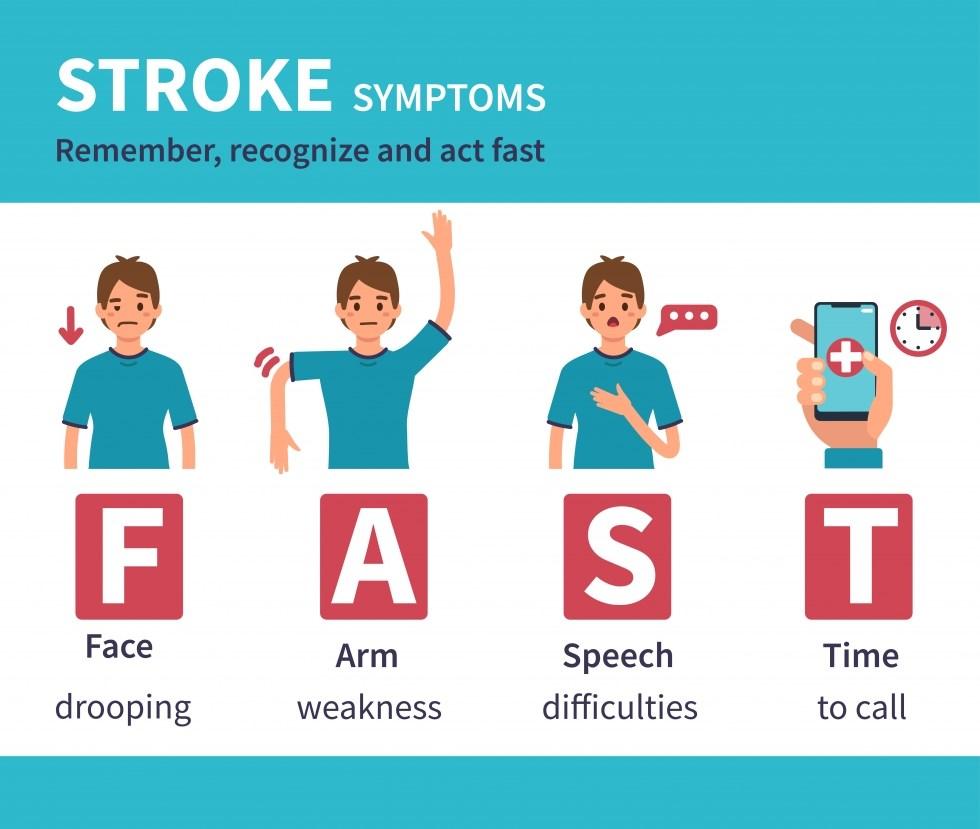
factors that you can control. The followingstrategiesareveryuseful:
1.Dietarychanges
• Eatplentyofvegetables, legumes,andfruits.
• Includeleanmeat,fish,poultry, oralternatives.
• Includemilk,yoghurt, cheeses and/oralternatives.
• Drinkplenty ofwater.
• Limitsaturatedfatandtotalfat intake.
• Limitsugarandfoods containing addedsugars.
2.Stopsmoking
3.Regularannualscreeningfor diabetesandhighcholesterol
• Men–startatage35.
• Women–startatage45.
4.Haveregularexercise
• Atleast30minutesadayon5or moredays perweek
• Ifyouaretoobusy tofindtime forexercise
Take the stairs instead of the elevator.
Park your car farther away from youroffice
Take a longer route when you walkfromoneplace toanother.
THINKING ALOUD ISSUE 22 | APR - JUN 2023 | 11
R D S F
Facial Keloid Scar AN AESTHETIC ENIGMA
by Dr. Oluseyi Ibukun-Obaro
Major injuries from cuts, crush, accidents, burns or surgical procedure may heal with keloid scarring. Conversely, injuries as innocuous as a pimple, mosquito bites, scratch wounds, minor bruises, shaving,canalsoresultinkeloid.
The normal coordinated wound healing process is disrupted and exaggerated leading to overabundance of collagen which builds up within the scar. This results in a raised, thick, itchy, and often darkly coloured scar. They can be very unsightly and sometimes painful especiallywhentheyareinfected.
ClinicalPresentation.
For individuals with facial keloid scars, the aesthetic implications may be far reaching as to affect their selfconfidence and self-esteem, causing social anxiety, emotional distress, and reducing the overall quality of
A keloid is a raised scar that develops at the site of an healed skin injury. It persist long after the initiating wound has healed; often increasing in size and growing beyond the boundaries of the initial wound. This feature distinguishes keloid from hypertrophic scars which are generally contained within the boundaries of the initiating wound.

Generally, all skin wounds heal with a scar which should remain flat when compared with contiguous skin and should regress (even out) with time. A few skin injuries however develop into an ugly raised scar which persist.
Keloids are commonest in the negroid race and rare in Caucasians with a ratio of up to 19:1 in these demography. The disfigurement and assault on beauty especially when it occurs on the face (facial keloid) often require professional intervention.

Facial scars are a frustrating problem to deal with as they often recur if appropriate treatment is not carefullyinstituted.
“Generally, all skin wounds heal with a scar which should remain flat when compared with contiguous skin and should regress (even out) with time. A few skin injuries however develop into an ugly raised scar which persist.” Cause.
The exact cause of keloid is not clearly understood. Many factors have been attributed keloid but none has been able to fully explain the mechanismofitsformation.
Some factors suggested include hormonal, immune dysfunction, skin tension and immune reaction to sebum.
Genetic predisposition to keloidal scars have been reported in the literature but the exact genes responsible are still a subject of conjecture.
The consensus is that keloid results from injury to the dermis of the skin. Any skin injury can result in keloid formationinthepredisposed.
Symptoms include itching, pain, recurring infection and pus discharge and even sleep disturbances. The complaints vary in differentindividuals.
There is no gender predilection but it is usually assumed and sometimes reportedtobecommonerinfemales.
The practices of facial piercing (ear, nose, lip etc) which are commoner in females may account for these assumptions. In females, a common site is the earlobe from additional piercings whilst in males, razor bruises during shaving or barbing makes it common in these shaved areas.
Curiously, keloids are found to be rare in the extremes of ages (very young and the elderly), occurring mostly in the 2nd and 3rd decades of life.
“Symptoms include itching, pain, recurring infection and pus discharge and even sleep disturbances. The complaints vary in different individuals.”
12 A QUARTERLY MAGAZINE R D S F
scars can vary, but may include surgical, physical and medical interventions. A single intervention is usually inadequate to treat this malady. Surgical therapies include coreexcisionortotalexcisions.
Physical measures include pressure therapy, laser therapy, cryotherapy and radiation therapy. Medical interventions are plethora but steroid injections remain the most used medical modality. The goal of treatment is to flatten the raised scar and prevent recurrence which is the major complication of treatment. A combination of these treatments is usually employed to vanquish keloid especially if recurrence is to be prevented.
As a facial surgeon, I always strive to provide the best possible care and outcome for my patients with facial keloid, as I understand the impact that these scars can have on their lives.
If you know someone struggling with facial keloid scars, please advise them to seek out a qualified medical professional who can help determine the best treatment options. However, be mindful that every individual and scar is unique, so it's advisable to
Nigeria), dermatologist or plastic surgeon to determine which treatment may be best based on the severity and location of the keloid scar. Do not self medicate. Importantly, do not patronise quacks as they worsenanalreadycomplexcase.
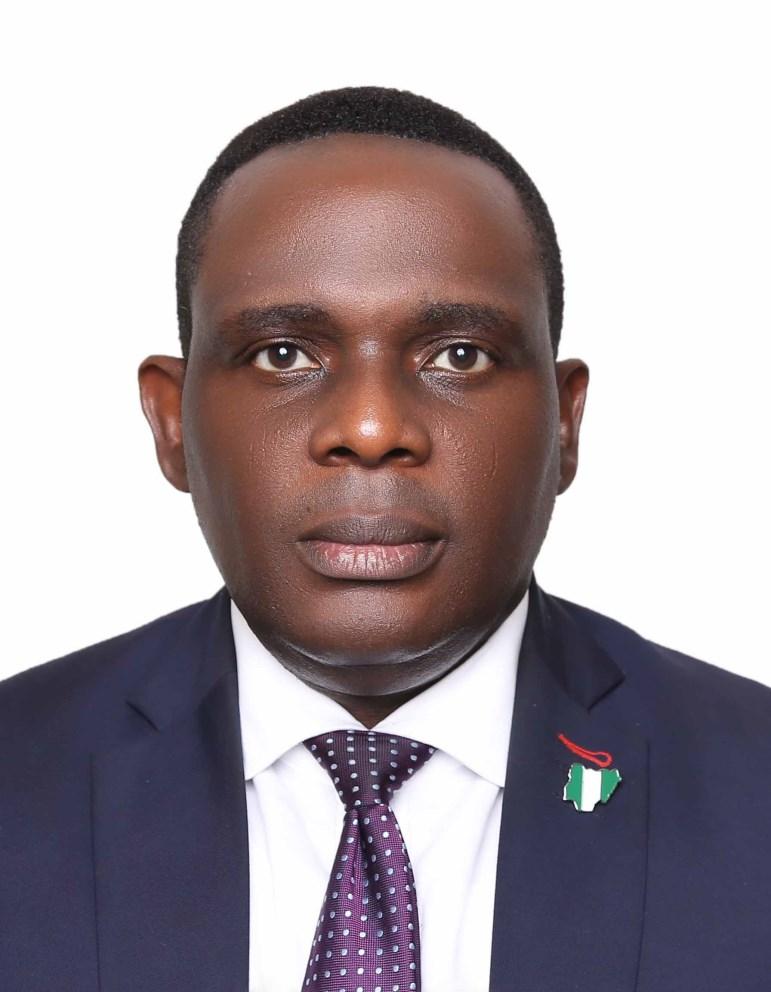
“As a facial surgeon, I always strive to provide the best possible care and outcome for my patients with facial keloid, as I understand the impact that these scars can have on

injured skin. They can occur anywhere in the body but when they occur on the face, they are immediately evident as they cannot be concealed, often resulting in physical and emotional distress for thesufferer.
Beauty is immediately challenged, necessitating immediate professional attention. It is majorly a black man's problem. Choice of treatment should becarefullysourced.
Treatment of this aesthetic enigma has been a subject of much research. It is better to leave it untreated than to get the wrong treatment. Recurrence is unforgiving. A word is enoughforthewise.
THINKING ALOUD ISSUE 22 | APR - JUN 2023 | 13
R D S F
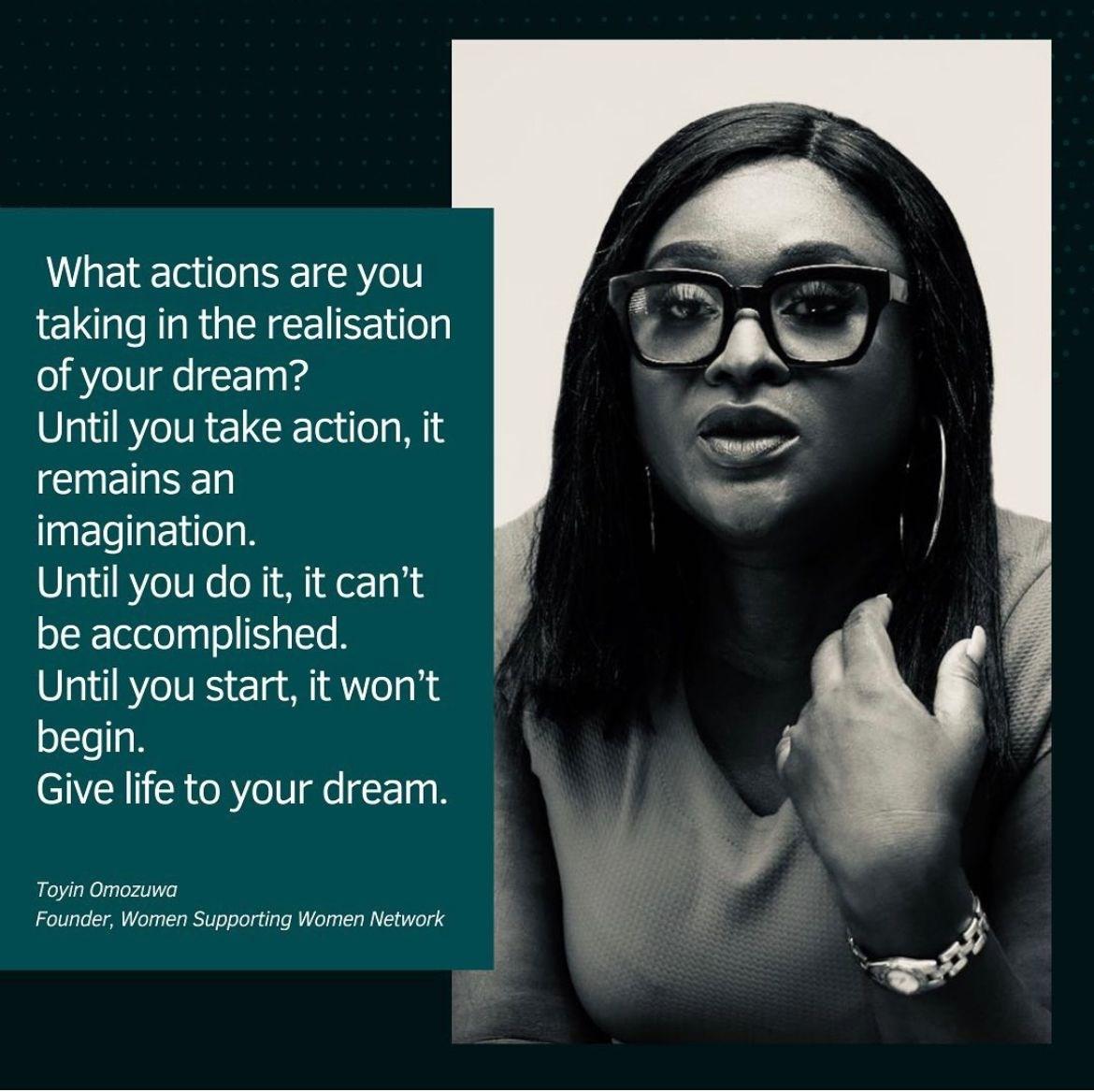
14 A QUARTERLY MAGAZINE
Who is Mrs Toyin Omozuwa? Please introduce yourself to our readers.
Mrs. Toyin Omozuwa is a strategic and resultdriven communication specialist with over 25 years of broad-based experience in public and media relations. The multi-competent, seasoned broadcast journalist who has worked in leading television stations in Nigeria, holds a first degree in Mass Communication, a Post Graduate Diploma in Public Relations and Advertising and a Master’s Degree in Media Arts from the University of Abuja.
Toyin Omozuwa is fearless in the pursuit of what sets her soul on fire. She communicates vision, purpose, and core values. Her mantra is “Be Unstoppable”. She is driven by passion, purpose, love, and service to humanity. These serve as core of her life and practice. She offers support and counselling to indigent women, victims of Genderbased violence and creates platforms for survivors to share their stories.
Founder, Women Supporting Women Network and Host, ‘Be Inspired Series’, a bi-monthly virtual programme tailored to discuss topical issues and teach tested and timeless principles for growth and success. Participants join from across the globe.
Toyin Omozuwa is married and blessed with three teenagers.
“Toyin Omozuwa is fearless in the pursuit of what sets her soul on fire. She communicates vision, purpose, and core values. Her mantra is “Be Unstoppable”.”
Can you walk us through some of the key events and milestones in your life that have led you to where you are today? How has your upbringing and personal experiences influenced your decisions and career paths?
I grew up in a beautiful family of five. I call it beautiful because of how my parents fostered love and unity among us. I was not over-pampered, having been nurtured and mentored by two great disciplinarians; my loving parents, but I enjoyed undiluted love, great care and every good thing you could possibly think of. Most of my strongest values come from lessons I learnt from my parents. From them, I learnt diligence, integrity, generosity, care for others, humility, forgiveness, kindness, gratitude and service to humanity. I will always be thankful to my parents. They were my heroes. They taught me how to exercise my faith in God and the power of prayer.
I recall as a teenager, when I lived within the confines of how people defined me, it affected my self-esteem and became a limitation to unleashing my potential. My parents’ support and prayers helped a great deal. I was finally liberated when Grace found me. I began to define myself from God’s viewpoint. Accepting God’s definition for my life was one of the major turning points in my journey. Apart from helping me understand my “why”, it set me on a path of intentional living and I am purposed to live my life to the fullest. I also determined to help people change the unpleasant mindsets and narratives they have about themselves, maximise their potential and actualise their dreams.
My passion to help women was borne out of the traumatic experiences some of my female colleagues and friends went through. Key among these were domestic violence, verbal and psychological abuse. More so, they lacked a good support system. I recall vividly an experience where a colleague’s husband came to the office to publicly humiliate himself by beating his wife. It took the intervention of other colleagues to hold him back. It probably would have been deadly. That hit me hard. The truth is, it doesn’t matter what she did, it’s not okay to hit a woman.
I later discovered she wasn’t the only one going through domestic violence. I identified a few of them, reached out and offered counselling. From counselling, I discovered that they lived in constant fear and lacked the needed support. A friend’ s sister also died untimely from the brutality of her husband. The stories increased. This gave birth to my desire to help women going through domestic violence or any form of abuse understand that they deserve better and should choose to reach out for help and stop suffering in silence. Violence thrives in silence.
Most victims of domestic violence choose not to leave their abuser due to loss of self-esteem, fear of being embarrassed, ridiculed or stigmatised, fear of the unknown and majorly, believing abuse is normal. It actually takes courage to leave an abusive relationship. To offer support, I started an online closed group just for women called “Woman to Woman” to interact, unwind and share their stories. Being a closed group, some survivors of domestic violence were able to share their stories. This gave courage and voice to victims of domestic violence.
In addition, I share inspirations on the group to help women develop and boost their self-esteem and confidence. We hold physical meetings where some survivors of domestic and sexual violence share their stories to inspire and strengthen other
THINKING ALOUD ISSUE 22 | APR - JUN 2023 | 15
R D S F
women. The meetings also encourage women to break their silence, develop themselves, awaken the greatness within them, deliver value and pursue excellence in all things. My fields of study and work experience contribute greatly to what I do. It has enhanced my speaking, planning and writing skills through which I reach a large audience.
“My passion to help women was borne out of the traumatic experiences some of my female colleagues and friends went through. Key among these were domestic violence, verbal and psychological abuse.”

Can you tell our readers about the Women Supporting Women Network (WSWN) and the services and programmes the organisation provides?
For wider and greater impact, the online closed group metamorphosed into WOMEN SUPPORTING WOMEN NETWORK (WSWN) in 2019. Women Supporting Women Network (WSWN) is a non-profit organisation which seeks to empower women with capacity and capabilities to explore their potential for living a fulfilled life in all spheres of life.
Women Supporting Women Network holds digital and real-life events to help people unwind, network, share inspirations, exchange ideas, build their career, mental health, relationships, businesses, reach their financial goals, thrive and live their utmost.
We invest in programmes and projects that strengthen the voices of the marginalised and vul nerable, promote economic advancement, leader ship, and well-being of women.
We envision a world where women come together and help each other thrive. Our belief is that wom en should experience life free from poverty, vio lence, exclusion and discrimination. Through our outreach programmes, we have trained many rural women in different skills acquisition programmes for their empowerment.
Our core values are; Excellence, Care, Respect, Dignity, Inclusiveness, Equity and Advocacy.
What inspired you to start the Women Supporting Women Network, and what was the motivation behind this?
My inspiration comes from God’s dealing with me and on His commission “to help the afflicted, bind up the wounds of the broken-hearted, proclaim release from confinement, pain and oppression”.
I was also driven by the passion to give women a voice, promote gender equality, help women deal with issues of depression and suicidal ideation, attain financial freedom, maximise their potential and live their utmost. I strongly believe women should experience life free of violence, poverty, exclusion and discrimination.
The need for a strong support system for women was also a strong motivation. I realised most women lacked good support systems. Who to run to, Where to go to, how to navigate and who to speak to in the midst of crises, especially domestic violence victims.
The importance of a support system cannot be over emphasised. It creates the needed cover and succor for battered women, survivors of domestic and sexual violence. It also gives hope, courage, strength, comfort and healing to women battling depression, trauma, mental illness and other issues.
Women Supporting Women Network has grown to become a pillar and safe place to women. We offer counselling, therapy, trainings, pro bono services, among other things.
In your opinion, what are some of the key challenges that women face today, and how does your organisation aim to help solve these?
Key among the challenges women face are domestic
16 A QUARTERLY MAGAZINE
“I strongly believe women should experience life free of violence, poverty, exclusion and discrimination.”
R D S F
We seek to address these challenges through our four-point agenda which include:
LIFTING WOMEN OUT OF POVERTY
We are committed to ensuring that no woman is a victim of poverty. We create platforms that will enhance financial literacy and seek funding opportunities for women initiatives and skill acquisition programmes. This is borne out of the belief that an empowered woman empowers communities.
EDUCATING WOMEN TO LIVE ABOVE ABUSE
Abuse is a common feature in an androcentric society like ours. This abuse manifests in violent and subtle forms like rape, sexual abuse, emotional abuse, etc. When a woman is abused, her capacity to excel is stunted. Recognizing that abuse is a growth impedance, WSWN seeks to educate society about the heinous culture of abuse and collaborate with policy makers to ensure abuse is relegated to a historical past. In appreciation of the behavioural change function of the media, we will harness media platforms to push to the fore of public consciousness, abuse related issues.
FOSTERING RELATIONAL FULFILMENT
Relational satisfaction is central to the pursuit of happiness. This is an elusive phenomenon for many women. Hence, we seek to create interactive platforms where women can share their perspectives and experiences on building healthy relationships in every sphere of life.
GIVING WOMEN A VOICE
The marginalisation of women is an age long problem. To the detriment of society, women lack the agency in different spheres. At women supporting women network, we seek to strengthen the voices of the marginalised and vulnerable by educating and empowering women to have a voice in issues relating to their ontic wellbeing.
PARTNERSHIP AND NETWORKING
We seek to network and partner with other women NGOs, corporate organisations, government agencies and the media to advance the society through women empowerment.

“When a woman is abused, her capacity to excel is stunted.”
What is the WSWN doing to create a safe and inclusive space for all women, regardless of their backgrounds or experiences? What can government do?
We organise fora where women are informed and educated about their rights and significance, promote a culture of respect, create platforms where women could unburden; talk and be heard.
We celebrate differences and prioritise inclusion over diversity. We have a support system for survivors of gender based violence. Furthermore, through the execution of our 4-point agenda, we will continue to create a safe and inclusive space for all women, regardless of their backgrounds or experiences.
What can government do to create a safe and inclusive place for all women, regardless of their backgrounds or experiences?
Government at all levels; local, state and federal should take bold steps to promote inclusive economic advancement, protect women’s human rights, and address social and economic inequalities that hold women back from achieving their potential. Government should support policies and initiatives that promote social justice and take concrete steps to implement them, remove barriers to social justice for women, ensure opportunities for the advancement of social justice for women are in
THINKING ALOUD ISSUE 22 | APR - JUN 2023 | 17
R D S F
place and ensure that women have access to basic services. Government should also promote gender equality and empower women to participate fully in all aspects of social and economic life.
The Orange Forum is one of the many initiatives you created to empower women. Kindly share with us the objectives of the programme and the successes you have been able to record.
The Orange Forum is an annual campaign of WSWN, held in observance of the International Day for the Elimination of Violence Against Women.
This campaign aims to prevent and eliminate violence against women and girls around the world, calling for global action to increase awareness, promote advocacy and create opportunities for discussion on challenges, impact, solutions, mental health and support systems.
Women Supporting Women Network has an ethical vision of a world where the voices of women are not muffled. We envision a world where victims of violence can access justice, a world where violence is possibly eliminated. So, The Orange Forum is one of the tools we use in achieving this.
The annual campaign also creates a platform for survivors of sexual and Domestic Violence (DV) to share their stories with participants. This in turn gives courage to DV victims to break their silence and reach out for help. So far, we have had four successful campaigns; one live and three, virtual. The feedback is always amazing and inspiring.
Gender inequality has been a global issue. The Global Gap Report ranked Nigeria 123 with a score of 63.9% out of 146 countries. Even countries like Rwanda, Namibia, and South Africa were ahead of Nigeria. What role do you think the government can play to improve women's participation in wealth creation and politics?
Promoting gender equality can be an economic game changer. Government should therefore promote gender equality and encourage financial inclusion. Closing the gender gap would mean higher growth and productivity and greater economic stability. Gender Equality represents a safer, healthier, and more prosperous society for all.
Promoting financial inclusion among women can help provide women with the opportunities to start businesses, get an education, and increase their independence and agency. Due to discriminatory laws, institutional barriers and disproportionate access to
quality education, healthcare and resources, women worldwide continue to be marginalised in the political arena. Government should create enabling environment for women to reach equal and sustainable political participation by breaking down the barriers and create opportunities for women at each level.
Furthermore, Government needs to promote women ’s rights, promote gender sensitive policies and foster inclusivity in leadership, civic engagement and decision making in political processes.
“Promoting gender equality can be an economic game changer. Government should therefore promote gender equality and encourage financial inclusion.”
As an advocate against gender-based violence, what are the identified factors that have contributed to this menace in Nigeria and what are the institutional remedies available for a victim to seek redress?
Gender-based violence (GBV) is a complex issue with multiple factors contributing to its prevalence in Nigeria. Some of the identified factors include:
1. Patriarchal norms: In Nigeria, patriarchal norms still dominate many aspects of society, with men often seen as the head of the household and women expected to be submissive. This can create power imbalances that contribute to gender-based violence.
2. Weak legal framework: While there are laws in place to protect women from GBV, they are often not enforced or implemented effectively. This can make it difficult for victims to seek justice.
3. Poverty and inequality: Poverty and inequality can exacerbate GBV, as women may be more vulnerable to violence if they are economically dependent on their abusers.
4. Lack of awareness: Many people in Nigeria still do not fully understand the gravity of GBV or the impact it has on victims, which can lead to a lack of support for victims and a culture of victim-blaming.
In terms of institutional remedies, there are several options available for victims of GBV in Nigeria. These include:
1. The police: Victims can report incidents of GBV to the police, who are responsible for investigating and prosecuting offenders.
18 A QUARTERLY MAGAZINE
R D S F
2. Legal aid: Victims can access legal aid services, which provide free legal representation and advice to those who cannot afford it.
3. Non-Governmental Organisations (NGOs): There are several NGOs in Nigeria that provide support and services to victims of GBV, including counselling, medical treatment, and shelter. Women Supporting Women Network is one of them. We provide legal aid, counselling, and support.
4. The National Agency for the Prohibition of Trafficking in Persons (NAPTIP): NAPTIP is a government agency that is responsible for combating human trafficking and other forms of GBV. Victims of GBV can access support and services through NAPTIP.
Overall, while there are institutional remedies available for victims of GBV in Nigeria, there is still much work to be done to address the underlying factors that contribute to GBV and to create a culture that supports and empowers victims.

Given the different cases of domestic violence, how can law enforcement and the criminal justice system better respond to domestic violence cases?
Domestic violence is a serious social problem in Nigeria, and it requires a comprehensive approach by law enforcement and the criminal justice system
to effectively respond to it. Law enforcement and the criminal justice system can better respond to domestic violence cases in Nigeria through:
1. Increased Sensitisation: Law enforcement and the criminal justice system need to increase awareness of domestic violence, its effects on victims, and the punishment for perpetrators. This will help victims of domestic violence report cases more often and make the criminal justice system more effective.
2. Improved Investigation Techniques: The law enforcement and criminal justice system should adopt new investigation techniques that consider the psychological state of victims, their safety, and the potential risk to their lives. This should incorporate forensic evidence collection, crime scene analysis, and interviews with relatives and friends.
3. Specialised Domestic Violence Units: The law enforcement and criminal justice system should establish specialised domestic violence units to investigate and handle cases of domestic violence. These units should be trained to provide support, counselling, and shelter to victims.
4. Implementation of Domestic Violence Laws: Nigeria has existing domestic violence laws, but there is a need to ensure that they are implemented effectively. Police officers and the judiciary should
THINKING ALOUD ISSUE 22 | APR - JUN 2023 | 19
R D S F
be trained on how to apply these laws for successful prosecution.
5. Collaboration with Civil Society Organisations: Law enforcement and the criminal justice system should collaborate with civil society organisations that have specialised experience in dealing with domestic violence cases. These organisations can help provide support to victims and encourage them to report cases.
In summary, the key to effectively responding to domestic violence cases in Nigeria is for law enforcement and the criminal justice system to adopt a more sensitive approach. With increased awareness, specialised units, improved investigation techniques, and collaboration with civil society organisations, the fight against domestic violence can be more effective.

Talk about your values. Do you share similar values? Are you compatible? Engage in open and honest conversations. How much of each other do you know? What is a Deal-Breaker for You? Everyone has different deal-breakers. Be open about what yours are, and listen to your partner’ s. Decide together whether you can deal with those and if they seem reasonable to you.
Talk about everything; finances, children, in-laws, career, etc. How do you plan to raise your children? You need to be honest about any debt, credit cards and potential overdrafts before tying the knot. This is one to discuss as soon as you get engaged to make sure you ’re not overspending on a wedding, when you might have debts to clear.
Marry your friend. Marry someone that respects you and someone you can respect. Marriage is a relationship between two forgivers. Does your partner easily forgive? Trust is another important consideration. Do you trust each other? How sincere is your partner with you? How open are you to each other? Marry someone that trusts you and someone you can trust. Marriage doesn’t change people. It only amplifies their character. Marry someone with godly character; who loves and fears God; someone who points you always to God and not distract you from Him.
As a life coach to young people, what are the indispensable negotiations young people should have with their partners before considering marriage?
Define marriage. You may have different perspectives about marriage. So, take time to talk about how you both think your combined lives should be structured. Have open conversations about what your idea of marriage is and what your expectations are from your spouse. In these conversations, you may discover that you and your partner have very different ideas of marriage. Talking about it will be helpful. Be sure you are both heading in the same direction. Your purpose will determine your direction. Why would you want to spend the rest of your life with someone with no purpose or direction or someone heading to the north while you are heading to the south? So many women have sacrificed their destinies on the altar of marriage.
Marriage should enhance your destiny. Talk about your vision. Does your partner believe in your vision? This will determine the support you will get when you marry. Marry someone who is personally and consciously involved in advancing your goals. Partners must actively help each other to move forward. Marry someone that is not intimidated by your success or victories. Discuss your short and long term goals.
Don’t marry for the wrong reasons. Marriage was not created to make you happy but to make you better. If you can’t be happy or find your joy as a
20 | A QUARTERLY MAGAZINE
“The law enforcement and criminal justice system should establish specialised domestic violence units to investigate and handle cases of domestic violence. These units should be trained to provide support, counselling, and shelter to victims.”
R D S F
No School’. Please share with our readers what motivated the campaign and the lessons you learned while working on that project.
Women Supporting Women Network joined the “No Protection No School Campaign on the 17th of December 2021. The campaign was championed by Mr. Taiwo Akinlami, an Egilitarian, Social Development and Public Interest Lawyer of over 20 years.
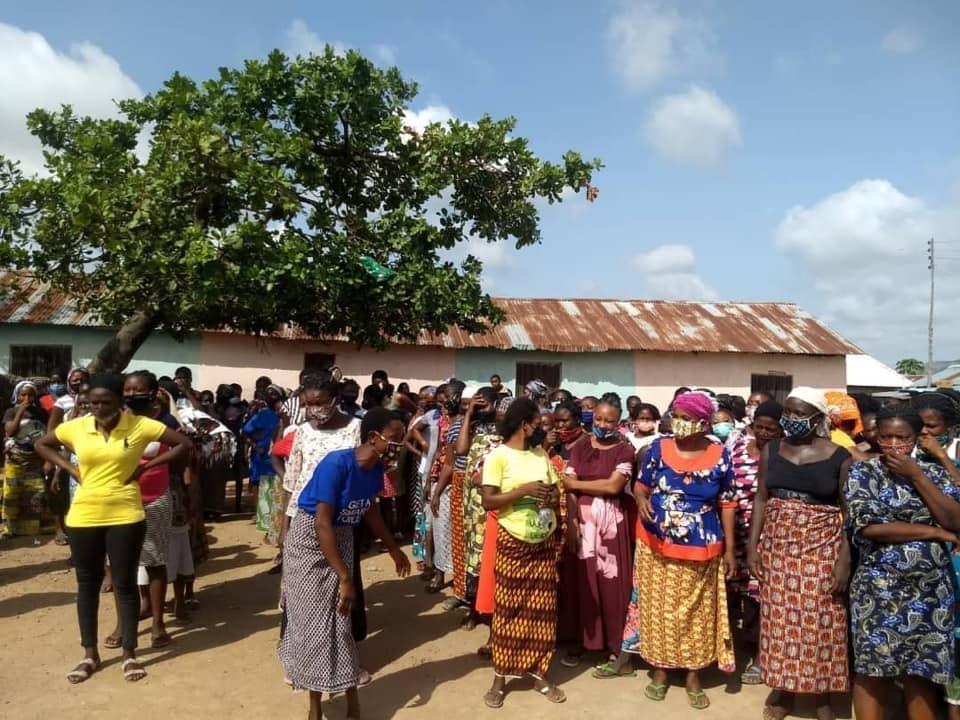
The campaign which started with stimulating discussions, was in honour of late Sylvester Oromoni, for Justice and a safer environment in Nigeria. It canvassed for a secure, friendly and protective environment for our precious children within the school system, employing the System’s Approach.
System’s Approach begins with installing in a school, a Child Protection System, codified into a POLICY, broken down into PROCESSES on which every stakeholder in the school (including parents and children) are periodically trained on the roles.
It is common knowledge that the well being of the precious African child is threatened on all sides and in all places. This is because most of Nigeria’s private and public institutions are yet to accept the wisdom in System’s Approach to child protection and this makes children subject to one form of abuse or the other.
The campaign ran successfully till the end of January 31, 2022, and metamorphosed into a bigger campaign, #NOPROTECTION NOCHILDREN.
LESSONS FROM THE NO PROTECTION NO SCHOOL CAMPAIGN
• Every child matters.
• Every child should be treated with respect and dignity.
• Every child has rights which should be recognised, respected and protected
• The absence of the commitment of our private and public institutions in Africa to System’ s Approach to Child Protection is an existential threat to existence of our precious children. Once there is no System, our precious children are not protected anywhere, including within the family, once they are not protected, then, childhood is threatened with extinction.
• The protection of our precious children is everyone ’s responsibility. We all need to promote child safety and protection in schools, religious institutions, homes, society.
THINKING ALOUD ISSUE 22 | APR - JUN 2023 | 21
“It is common knowledge that the well-being of the precious African child is threatened on all sides and in all places.”
R D S F
Drug abuse and addiction
You once hosted a programme to bring attention to drug abuse and addiction. Please share some lessons from this programme. What is the place of emotional support by friends and family members to people struggling with drug abuse and addiction?
Yes, we hosted a programme with the theme, ‘Freedom from Drug Addiction’. Drug addiction is one of the major health challenges across the globe. A chronic, often relapsing brain disease that causes compulsive drug seeking and use, despite harmful consequences to the drug addict and those around them.
From the programme, we learnt that factors such as peer pressure, physical and sexual abuse, early exposure to drugs, stress, and parental guidance can greatly affect a person’s likelihood of drug use and addiction. Second, drug addiction is treatable and can be successfully managed. No case is a write -off and therefore, no drug addict should be written off. Third, recovery is a journey. Fourth, drug use and addiction are preventable. Fifth, parent-child communication on drug abuse prevention is needful. Prevention programmes involving families, schools, communities, and the media are effective for educating and preventing or reducing drug use and addiction.
What is the place of emotional support by friends and family members to people struggling with drug abuse and addiction?
A good support system is essential for people struggling with drug abuse and addiction. Like I mentioned earlier, recovery is a journey. The journey to recovery for individuals struggling with addiction can be very challenging. Having a support system, along with other treatments and therapy, is very important for ongoing success and fighting against relapse. People struggling with drug abuse and addiction require physical and emotional support, acceptance, patience, understanding, motivation and prayers, not abandonment or rejection.
It is not uncommon for individuals recovering from addiction to feel lonely and isolated. Having a support system can provide comfort, company and incorporate people into their lives that might relate to what they are going through.
The support system does not have to be made up of just family or friends. Support groups are a great way to start building connection with individuals in an environment that is free from judgment.
Financial freedom
You have used the WSWN platform to encourage financial education and financial independence, how important is it for women/men to be financially independent and what important steps do you think people need to take to get to that point?
We are honoured to have Mrs. Bimbo Komolafe, the Executive Director/Co-Founder of Rehoboth Dream Solid Foundation (RDSF) as our “adopted” financial coach in Women Supporting Women Network. She has graciously educated us on recipes for enjoying financial freedom, significance of financial planning, key principles for financial fitness, and application of the ESI model, among many other things.
Financial independence knows no age nor gender. It can be attained irrespective of your age or gender. Financial Independence is not defined by how much money you make, but by the freedom you have to live your life without limitations and financial burdens.
Being financially independent has so many benefits. This includes better living standards, higher financial security, stress free life, better mental and physical health and peace of mind. Attaining financial independence takes a lot of hard work. It requires good financial habits, healthy spending patterns, proper planning and investing. Lack of planning, impulsive spending, improper expenditures, debts and wrong investments are all hindrances to pursuing and achieving financial independence.
Financial Independence makes money work for you and guarantees a comfortable post-retirement life. With discipline and careful planning, it is possible to achieve financial freedom or independence. Start by setting specific and realistic financial goals. This is key in achieving financial independence. Set measurable goals and put them in writing. Be intentional about setting monthly savings and expense budgets.
Financial freedom is impossible if you’re not living on a budget. Set wisely, spend less than you earn. Learn to track your spending. Invest. Saving is one thing, but investing is another. Develop an investment strategy and choose appropriate investments. Control debts; don’t let it control you, pay off debts, develop a debt reduction strategy. Create an emergency fund. It acts like a buffer between you and the unexpected life events that happen. Invest in your health because poor health maintenance can negatively affect your financial goals, plan for retirement and work with a financial advisor or coach.
22 A QUARTERLY MAGAZINE
R D S F
Women Supporting Women Network 2
Looking to the future, what are your organisation's goals? What are the future plans to expand your reach and impact and how do you plan to achieve them?
Our future goals include constructing a Shelter house for female victims of Domestic Violence in FCT Abuja. The construction of a shelter house will offer security and other supporting services to women who experience physical and psychological abuse, whose lives are under threats in their immediate family environment. These supporting services include: feeding, counselling, medical support, and legal aid.
From women suffering domestic violence to mentally distressed women, all will be provided with emergency assistance and guidance. In addition, educative programmes will be offered to empower survivors, help regain their confidence and psychological stability. They will be assisted in entering or re-entering the labour market in order to become financially independent.
Secondly is the construction of an Empowerment Centre for Women and in FCT, Abuja Nigeria. This is aimed at promoting the empowerment of women through education, training and information. Through this project, they will have access to
formal education, training in traditional incomegenerating skills such as handicraft production, as well as arranging and monitoring women's self-help groups, helping them to save money, have access to loans and create small enterprises of their own.
We are committed to helping women attain financial independence. We also have other Grassroots Humanitarian Projects aimed at providing communities with access to safe water and sustainable solutions to hunger. Furthermore, we will host TV/Radio programmes to educate women.
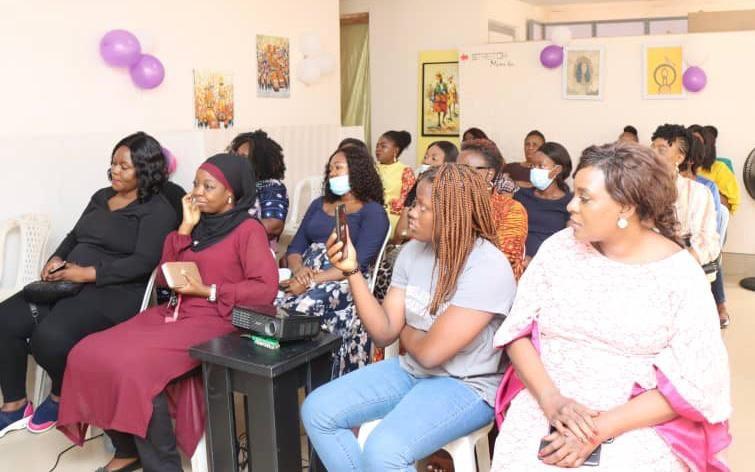
This will provide a platform to reach a wider audience of women and educate them on their physical and mental wellbeing and other issues that affect their lives in order to help them live their utmost. Most of these aforementioned goals and initiatives to reach and impact a wider audience are capital intensive. In achieving them, we will explore partnership with financial institutions and NGOs, leverage on corporate sponsorship, grants, etc.
also have other Grassroots Humanitarian Projects aimed at providing communities with access to safe water and sustainable solutions to hunger.”
THINKING ALOUD ISSUE 22 | APR - JUN 2023 | 23
R D S F
“We are committed to helping women attain financial independence. We
How can individuals or organisations get involved and support your efforts to achieve your organisation's goals?
We are open to collaboration, donations and sponsorship in support of our goals. We welcome volunteers too. Interested volunteers can join via our website wswnetwork.org or send a mail to networkwsw@gmail.com Donations can be sent to https://paystack.com/pay/wswn
We hear the phrase “women supporting women” a lot. In your opinion do you think women truly support women? Why do you think some women are the first to critic/tear down other women? What do women need to do better when it comes to supporting other women?
To a large extent, I will say, women support women. Unlike what it used to be, women are beginning to offer support to other women. Personally and as an organisation, most of the support we enjoy come from women. In our programmes, we communicate the significance of women supporting and empowering women.
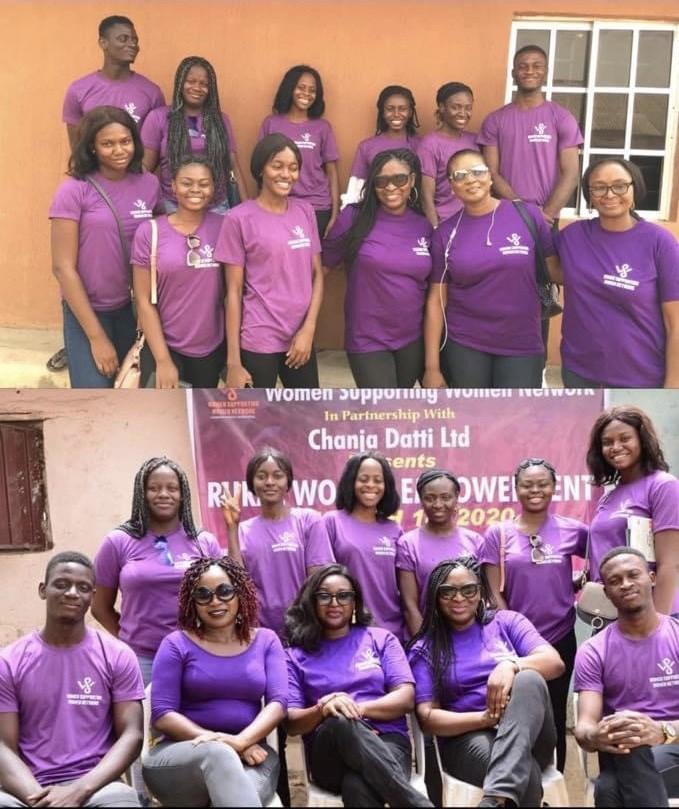
Nonetheless, some women haven’t truly understood its importance. So, rather than support, they pull down. Women need to understand that we rise by lifting others. When women support each other, incredible things happen. One woman’ s success can only help another woman’ s success.
I wish more women will come to the realisation that other women are not your competition. Stand with them, not against them. Celebrate their success without questioning yours.
As women, let’s endeavour to continually support, inspire, mentor and empower other women. Supporting women is not limited to financial support. Being available to listen, counsel, encourage and cheer women on are other forms of support. Making readily available information other women can benefit from is a form of support.
Parenting/work life balance
Some parents find it difficult to strike a balance between their financial and physical responsibilities as parents. Some do not get to spend enough time with their children because of the nature of their job/professions. As a parent, what has been your experience with work-life balance? How important is worklife balance and what advice do you have for parents on this?
The importance of work-life balance cannot be overemphasised Work-life balance is the act of separating one’s work life from one’s personal life in such a way that neither encroaches on the other. Considering the nature of our jobs, achieving worklife balance is tough, but not unachievable. It requires dedication, prioritisation and developing a realistic schedule.
24 | A QUARTERLY MAGAZINE
R D S F
We can`t truly be considered successful in our work if our homes are in shambles. Understand that there is no perfect work-life balance but there is a realistic one. Overtime, I have mastered the art of work life balance but didn’t get there in one day. It took me sacrifices, especially when my children were toddlers. Now, they are all teenagers, but I still make out time for them. Availability is key in parenting.
Our children need quality time with us. As parents, let’s be more involved in the different stages our children go through. Our guidance is key in all stages. How often do we communicate with our children? We need to communicate more. The fact that they say they’ re “okay” doesn’t mean they are really okay. One of the reasons some of them resort to suicide or drug addiction is because they had no one to share their struggles and fears with. Let’ s make our homes conducive enough for our children to open up to us.
Let’s spend more time with our children. It’ s one thing to be home with them, it’s another to be visible in their lives and pursuits. Our presence in their lives is more significant than the presents we give them and the “money we are making for them”.
When we have a good work-life balance, we are more likely to have the mental and emotional energy to give our children the loving attention they need to develop, learn and thrive. Some of us will have to make certain adjustments, change work
About you again
In hindsight, what advice do you have for your 25-year-old self and by extension any young girl reading this interview with big dreams for the future?
You are worthy of all you dream of achieving. Your dreams are valid. There is no height you can’t attain. There’s nothing you can’t accomplish. Be fearless in the pursuits of your dreams. Your potential to success is limitless. Your gender is not a barrier. Your age is not a barrier. Your location isn’t a barrier. Believe in yourself. Believe in your potential. Believe in God. Stop telling yourself you can ’t do it. Confront your fears. Deal with your excuses. You can do it. It’s in you, Stand up and be more. Don’t deny the world the impact of your dreams.
However, without action, the best of intentions are nothing but intentions. Until you take action, it remains an imagination. Until you do it, it can’t be accomplished. Until you start, it won’t begin. Begin NOW. Give life to your dream. Make it happen. Be unstoppable.
When Mrs Omozuwa isn’t working, how does she relax?
She listens to music or watches movies

THINKING ALOUD ISSUE 22 | APR - JUN 2023 | 25
R D S F
Thinking Aloud magazine reaches a diverse readership around the world including Nigeria, Zambia, United Kingdom, United States, Australia, Canada and the Philippines. Advertise in the magazine today and experience Growth in your enterprise.
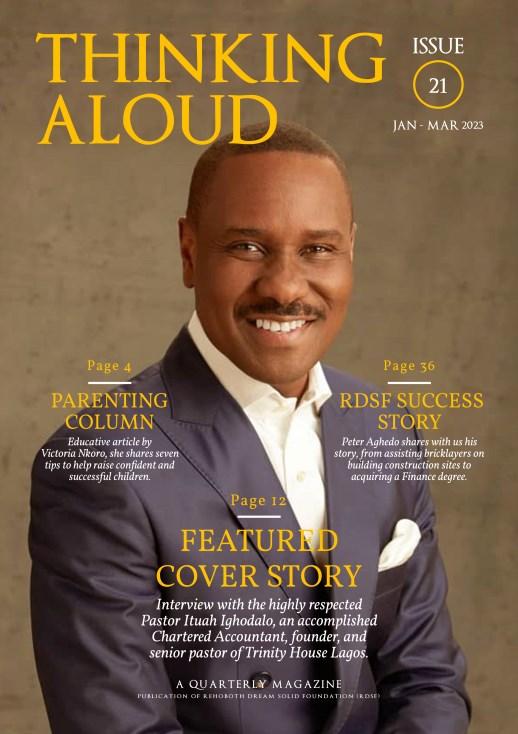
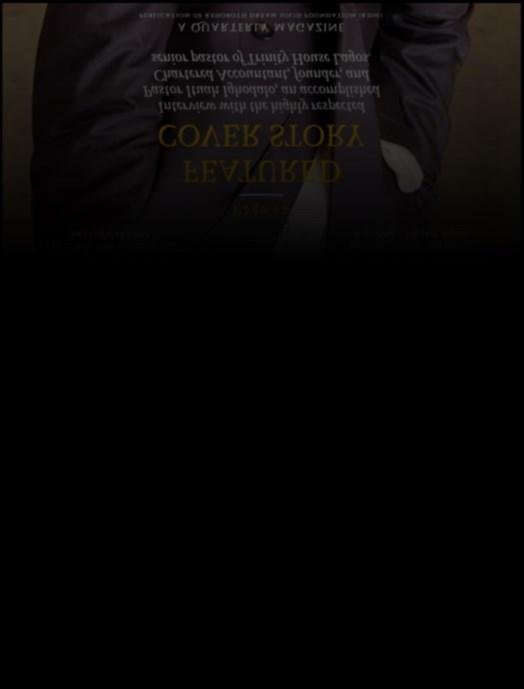
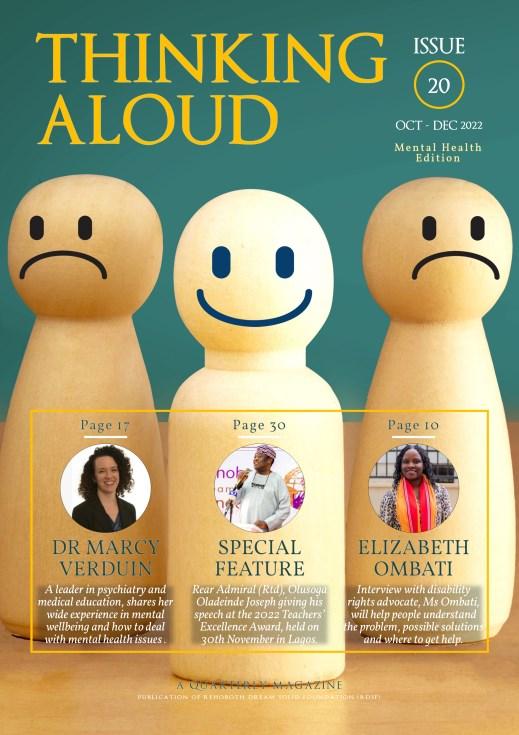
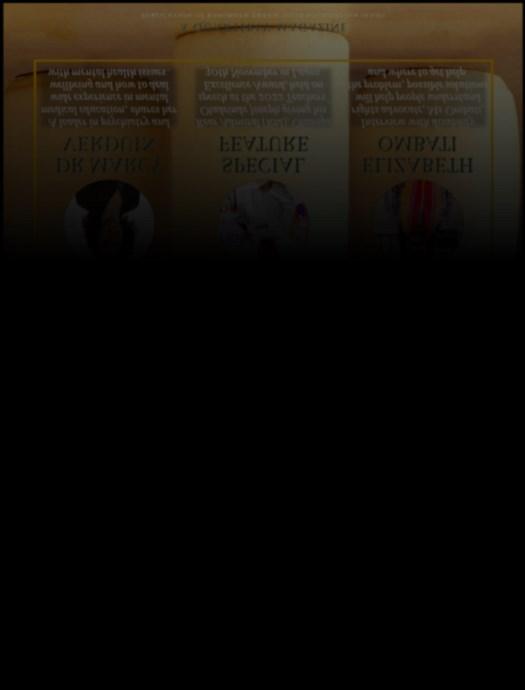

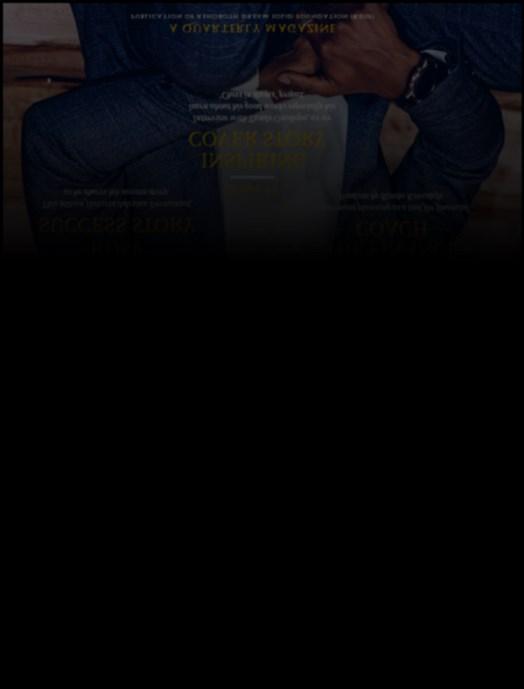

your advert enquiries to: thinkingaloudpublication@gmail.com
Send
IN MEMORIAM HONORING THE LEGACY OF MRS. ROSELINE IGBOKWE
NOVEMBER 2, 1965 - JUNE 19, 2023
Dear Esteemed Readers,
With heavy hearts, we share the sad news of the passing of one of our esteemed pioneer trustees, Mrs. Roseline Igbokwe. It is with deep sorrow that we bid farewell to a remarkable individual who played a pivotal role in the success and growth of our organization.
Mrs. Igbokwe, an extraordinary visionary and passionate advocate for empowering the indigent, dedicated her time, energy, and expertise to the mission of RDSF. As one of the founding members and a staunch supporter, she contributed immensely to our journey of rebuilding dreams, sharing hope, and fostering change.

Her unwavering commitment to empowering individuals and transforming lives served as an inspiration to us all. Mrs. Igbokwe's leadership, wisdom, and compassion have left an indelible mark on the work we continue to undertake.
As we mourn the loss of a remarkable trustee, we also celebrate her life, faith and enduring legacy. Mrs. Igbokwe's dedication and tireless efforts will
forever be remembered as we carry forward her vision of a better future for all.
In the spirit of honoring Mrs. Igbokwe's memory, we pledge to continue striving for excellence and unwavering commitment to our mission. We will honor her legacy by continuing to lend a helping hand to indigent students with the aim to give them economic empowerment.
On behalf of the RDSF family, we extend our deepest condolences to Mrs. Igbokwe's family and loved ones. May they find solace in the knowledge that her work has touched the lives of many and that her spirit will continue to inspire us in our pursuit of a more equitable and compassionate world.
We invite you, our valued readers, to join us in a moment of reflection and remembrance for Mrs. Roseline Igbokwe, a woman of God, a trailblazer, a mentor, and a true champion of the Rehoboth vision and mission.
THINKING ALOUD ISSUE 22 | APR - JUN 2023 | 27 R D S F
RDSF Trustees
INTERVIEW WITH MRS ROSELINE IGBOKWE
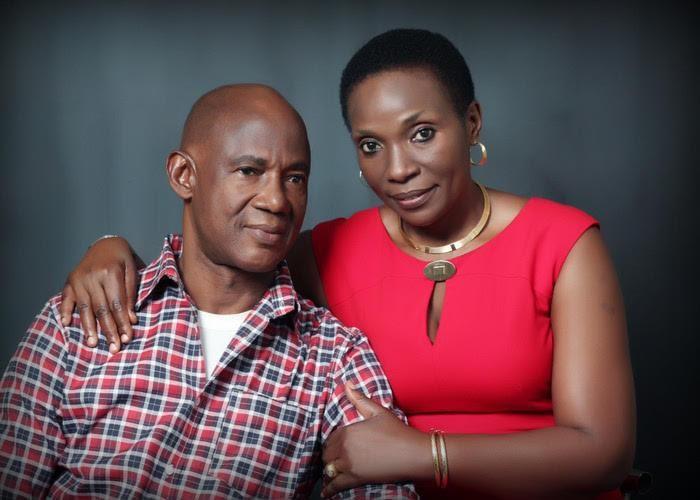
Tell us about your background – childhood, family, education and work experience.
I am the last child of four children of my parents. My father was a firm disciplinarian, he only counselled and never used the cane on me until I left his home for marriage at age 21. My mum was the ever-loving one who used the cane to discipline me whenever I did something wrong, and today, I still appreciate that for some reasons. I gained most of my educational qualifications on the job. I first worked with Texaco, which later became ChevronTexaco and is now Chevron. While working, I applied for “Tuition Aid” from my company for my first degree with University of Lagos, which was approved.
I got in, graduated, and then applied for another first degree in Applied Information Technology at Sikkim Manipal University, Manipal, India, which was also approved. I got in, graduated, and then applied for an MBA with University of Lagos and this was also approved. This was how I got educated and acquired skills over the years.
This took me from being a Stenographer, to Personal Secretary, to Confidential Secretary, to Executive Secretary, to Food Mart Supervisor, and
Chevron downstream was acquired by MRS Oil Nigeria Plc, I became the District Sales Manager, South-West Nigeria. I then delved into Finance and became the Credit Control Manager for MRS Oil Nigeria Plc’, Aviation Commercial, Retail Sales Manager for South East/South West Nigeria and finally Head of Sales & Marketing (national) (equivalent of National General Manager in other oil companies) before I took early retirement at the age of 50.
I am an ordained minister with The Redeemed Evangelical Mission (TREM) and have been a member of this church for 32 years. I have at various times held important positions which include Chairman, Disciplinary Committee of the Evangel Voices Choir and Team Lead with the Christian Women Fellowship. I am also a proud Trustee of the Rehoboth Dream Solid Foundation. I am happily married to my best friend, confidant & advisor and we are blessed with five children who are all successful in their various fields.
“I am the last child of four children of my parents. My father was a firm disciplinarian, he only counselled and never used the cane on me until I left his home for marriage at age 21.”
28 | A
MAGAZINE
QUARTERLY
R D S F
Is there anyway your upbringing has influenced your choice of charity? Are there other charity organizations you volunteer for?
I would say yes in a way, because I grew up seeing my mum helping the downtrodden and constantly providing help and assistance to the less fortunate.
She adopted two of my half siblings and treated them no less than she did the rest of us. She was a philanthropist even until she passed on to glory. I would say categorically, without mincing words, that aside from the Rehoboth Dream Solid Foundation (RDSF), I do not belong to any other charitable organization.
You are a pioneer trustee of the RDSF, can you share with us what inspired you to join the board despite it being a pro bono service?
Honestly, what inspired me to join RDSF was the calibre of other members of the board. They are well-informed, with honourable intentions, people of high integrity, transparent and selfless.
You are a deaconess in the church and we also noticed that majority of the current members of the Rehoboth Dream Solid Foundation Board Of Trustees were at one time or the other leaders in their local churches. Do you think there is a correlation between faith, practice and charity work?
I will say “Yes””. One thing you should know is that with every human being, God has deposited His plan and purpose even way before creating us. So “Yes” to the possibility that our faith might have something to do with our foundation.. Some nonChristians, Muslims, Jews, Atheists, Agnostics, etc who have been brought up correctly and are able to realize the need for charity and have the means to do it, also have been paramount in the creation and success of multiple charities worldwide.
Based on the success you had in your career working in an esteemed corporate environment, do you think corporate entities in Nigeria are doing enough in executing Corporate Social Responsibility programs?
In the past, Corporate Social Responsibility was what most multinationals and corporate organizations had passion for as they used them to attract customers to their brands, provide better work environment for their employees and attract more investors etc.

THINKING ALOUD ISSUE 22 | APR - JUN 2023 | 29
“...I grew up seeing my mum helping the downtrodden and constantly providing help and assistance to the less fortunate.”
R D S F
MrsRoselineIgbokwewithRDSFTrusteesandthewinnerofthe2018RDSFTeachers' excellenceaward.
This was done because companies that had ethical and social responsibilities successfully cultivated brand awareness and enhanced customer loyalty, and so, had competitive edge and attracted the best talents in society.
Social and ethical elements combined with technical tactics guaranteed long term productivity and financial success in these organizations. Now with what I can see, those good old days are no more as they used to be. I just hope and pray that this passion for CSR comes back.
You have been married for over 30years. Can you share with us some of the marital values that have kept your marriage?
I have been happily married for 34 years. I will not say it has all been a bed of roses, but what every person working towards marriage should know, is
My husband was the pastor of the house. Our policy is that whenever we have a misunderstanding, we settle it at night before devotion and become friends again.
We then tell each other how much we love and cherish each other. The fundamental beliefs that built our relationship reflects the identity that we have today in Christ.
God has been our First Love, our Father from time, the Head of our home, our Helper and our Source. Without Him, we would not have lasted this long together. Consequently, the key to thriving and having a long-lasting relationship as a couple is our compatible relationship values.
The core values that helped us over the years, include respect for one another, forgiveness every

R D S F
PharmSamIgbokweand MrsRoselineIgbokwe.
Even as a career person, you and your husband had to train five children. Kindly share some tips on how you were able to manage family routine with the demands of work.
As a career person and my husband, a busy Pharmacist/Businessman, I would say that it was not an easy task. However, because we ensured that God was brought into everything we set our minds to do, our faith helped us ease off the stress.
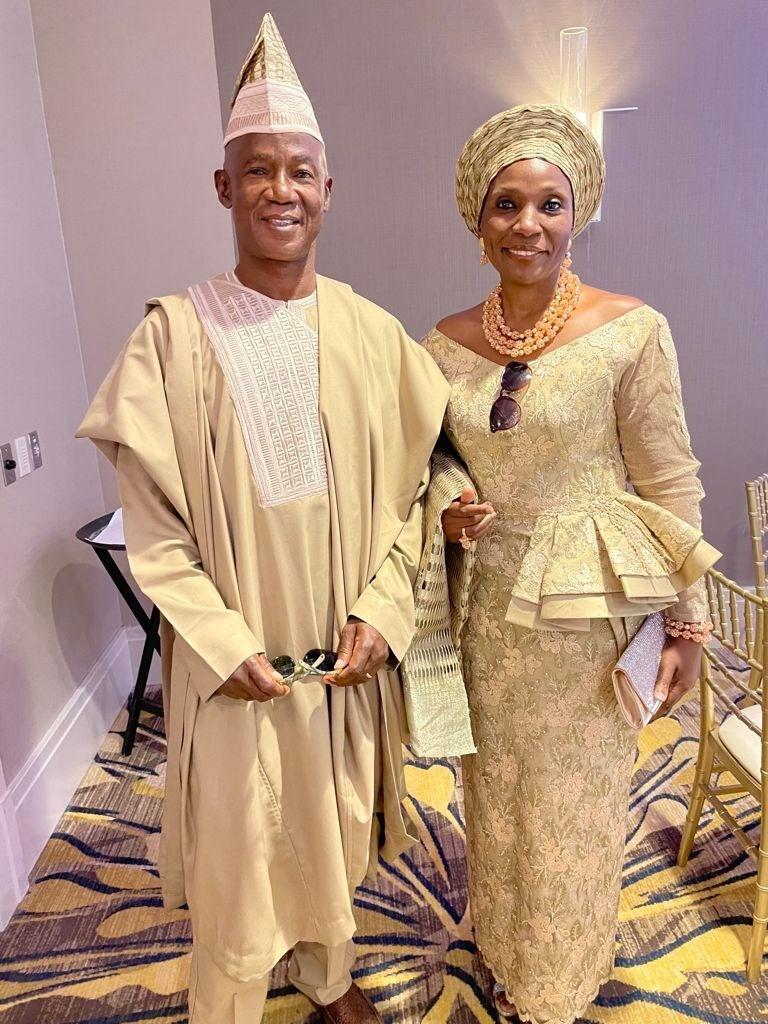
Training our children comprised mainly of constant godly counsel. Five children meant five personalities with five different characteristics. Remember that the home is the primary training ground for children and we must live up to expectations. Our church’s children department helped a great deal in parenting collaboration. We ensured that all five of them learnt to pray and be independent; we supported their training and honing of work skills, social skills, manners, good attitude and even godly principles.
In Africa we have certain traditional marriage values and expectations from our husbands, and so I had to juggle my 8-5 (or 6-9 in most cases), with stopping by after work to buy groceries, cooking for the family, schooling to improve my education, and bringing the children up in the way of the Lord.
We also ensured that as disciplinarians, the children did not mix with certain neighbours and we watched the kind of friends they kept. They also were not allowed to watch TV until weekends so that they could concentrate on their school work.
Surprisingly, my job did not suffer as a result of this. I usually strive to go above set goals. Whilst this might have put strain on me, it did not deter me from pushing myself. I am grateful that our children all turned out well by the grace of God and as parents, we have peace of mind as they all grew up to be very successful men and women.
I will like to acknowledge my late mum and my late eldest sister of blessed memories whose intermittent visits helped a lot. As the last born in our family, I definitely got the best lessons and tips from them in parenting and living peacefully with my young family.
“
Training our children comprised mainly of constant godly counsel. Five children meant five personalities with five different characteristics. Remember that the home is the primary training ground for children and we must live up to expectations.”
R D S F
PharmSamIgbokweand MrsRoselineIgbokwe.
Still on parenting, we have seen a rise in social vices within the last few years amongst our youth. As someone who has been mentoring young ones, kindly share your thoughts on how this menace can be curbed in our society.
I have mentored a small section in my church of our youth right from my young adulthood., Today I can say that the government and parents have failed the upcoming generation. I wish everyone was able to bring God into their homes and train up their children in the way of the Lord right from kindergarten up until university. The quest for getting rich in our society and the elders’ lifestyles have caused some of the youths to follow negative ways.
I feel we should also not give up yet on the younger generation, because where there is life, the hope of God changing things supersedes everything. Churches and religious leaders should organize programmes to reorientate them to think positively.
Parents should work to have close relationships with their children and if they see anything that is untoward, they should ask questions, critically review the situation and give moral advice where necessary. If we all continue without giving up, our youths and the country at large will come back to core African values.

The RDSF focusses on economic empowerment through charity activities in education, mentoring and skills acquisition. In your opinion, what is the most challenging problem confronting the educational system of Nigeria?
The most challenging problem confronting the educational system in Nigeria is lack of the youths believing in their God-given talents, as well as themselves. In our time, who were you to bribe a teacher to get great results? But it is a norm now which has affected the untapped potentials of these youths.
Unfortunately, this situation is not helped by the lecturers who accept bribes., Though not an excuse, the condition of service of these educators has room for improvement and is calling for Government attention. I believe that if parents shun the act of giving bribes and instead, mentor their children, this generation will lead the continent to become the giant that Africa is known to be.
“The most challenging problem confronting the educational system in Nigeria is lack of the youths believing in their God-given talents, as well as themselves.”
32 A QUARTERLY MAGAZINE
R D S F
MrsRoselineIgbokwewithRDSFTrustee,MrsBimboKomolafeatthe2018RDSFAnnual lecture.
What project executed by the Foundation do you have the most emotional connection to and why?
Definitely giving back to teachers. Parents easily forget that teachers are the least paid and the least recognized professionals, yet they provide half of the training our children need.
Teachers do have positive impact and power to change lives as they are the ones that see these children grow to adulthood. Whenever RDSF recognizes and supports some of them, in the past, I have shed some tears of joy with lots of gratitude in my heart for them.
For my looks, it is all about God. Prayerfully tell God how you want to look, don’t keep malice with people, forgive as quickly as possible, stay away from negative people, preach the gospel to people you meet, laugh always and be happy. I thank God for the husband God gave me and the children He blessed us with. I can honestly tell you, that they bring so much joy to my heart and I very rarely have any cause to feel sad or angry in any way (which I hear causes wrinkles)!
I also try to always remember that God is the one that gives health, so I thank Him for His unfailing grace and mercy towards me.
“
Based on your experience, what would be your advice to Nigerians interested in joining the board of an NGO or seeking to setup one?
Based on my experience with RDSF, I will ask anyone trying to set up an NGO or join one to consider a number of things. They need to be certain they have passion for the project. This is paramount.
Good research on the type of NGO they want to go into, the vision and goals must be clear, and they must ensure that the NGO is properly registered with the government. The ability to raise funds and demonstrate integrity to manage the funds well is also very important. , This will ensure availability of funds for the programs. They should also carefully and prayerfully look for likeminded people with high integrity.
We would like to end this interview by asking you to share with our readers your health and fitness routine because one can hardly guess your age by your looks.
Hahahahaha! My health and fitness routines vary. I do brisk walking in most cases with my husband and I also try to eat healthy, I drink about 5 to 6 bottles of 500ml of water daily. I don’t joke with my fruits first thing in the morning, I eat vegetables and portion-size my carbs and fatty foods. I also love cooking and baking what I eat in most cases.
For my looks, it is all about God. Prayerfully tell God how you want to look, don’t keep malice with people, forgive as quickly as possible, stay away from negative people, preach the gospel to people you meet, laugh always and be happy.”
Thank you!
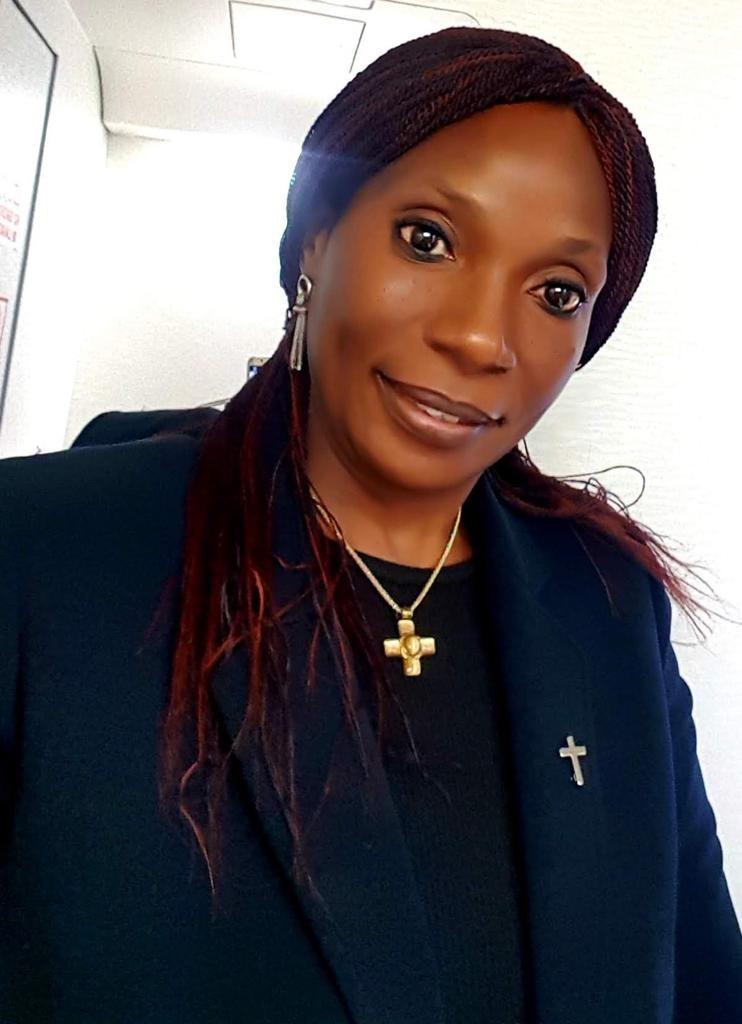
THINKING ALOUD ISSUE 22 | APR - JUN 2023 | 33
“Teachers do have positive impact and power to change lives as they are the ones that see these children grow to adulthood.”
R D S F
RDSF Updates
The Rehoboth Dream Solid Foundation (RDSF) is a charity organization whose mission is to engage in charity activities that will enhance the social and economic wellbeing of the less privileged through educational support, mentoring and skills acquisition programs. The Foundation is registered with the Ministry of Education and the Ministry of National Planning and Budget.

RDSF started operation in 2010 and awarded its first set of scholarships in 2011. As at today, the Foundation has supported over 250 students with some of them adopted from Primary school. The Foundation does not just give scholarships to these students but also takes proactive steps in organizing programmes aimed at promoting social values and career development. Many of the Foundation ’s past beneficiaries are now breadwinners funding the education of their relatives while advancing their career at home and abroad. We are proud of the success stories that have emanated from our past and current beneficiaries. We currently have 71 beneficiaries and some indigent students will be adopted within the year.
RDSF supported twelve students of Ekiti Baptist High School
In April, the Foundation supported twelve students of Ekiti Baptist High School located in Igede Ekiti, by funding the payment of the cost of their NECO examinations and giving them the opportunity to be future beneficiaries of the Foundation’s scholarship programme. Furthermore, three of our beneficiaries who were sponsored through secondary school gained admission to various universities to study law, accounting, and computer science. One of these students is an amputee and we are thrilled by his commitment towards his dream of becoming an accountant.
BRIEF PROFILE OF SOME OF OUR NEWLY ADOPTED BENEFICIARIES
Student A is a 300 level Pharmacy student of University of Uyo, and the first child in a family of six children. His late father was a motorcyclist and he died in 2010. His mother sells vegetables in the market and some of his siblings have dropped out of school; they assist the mother in the market.
During the ASUU strike, he took up a teaching job in a local private school to assist with the family upkeep. His fees are usually paid via loans from the market women cooperative taken by the mother. RDSF is happy to adopt student A to help him achieve his dream of becoming a pharmacist.
Student B is a 300 level Mechanical Engineering student of Federal University of Technology, Minna. He is the second child in a family of five children. His parents are separated and the mother who is a farmer in Kogi State is the breadwinner of the home. He goes home during holidays to assist the mother in the farm. Although the mother ’s dream is to train all of them to secondary school level, his passion for education made him to take the risk to further his education.
At a point in school, his Dean of Student Affairs provided him with a loan for accommodation, just to encourage him. When RDSF met with Godwin, he was sad as he felt his decision to further his education had mounted too much pressure on the mother and caused the family to incur debt. RDSF is happy to provide succour to student C and help him achieve his dream of becoming an Engineer.
‘’I wish to express my heartfelt gratitude for your help in financing my study, now, no fear, no worrying anymore, because God has shown me mercy through the Foundation’’.
34 A QUARTERLY MAGAZINE
1
R D S F 2
3
Student C is a 200 level Business Administration student of University of Uyo. She is the first child and has three siblings in public secondary school. During the ASUU strike, she joined her mother to hawk tissue paper but a recent call to the mother during our background check showed that the business has crumbled as it was the main source of income for the entire family.
Their father had lost his job during covid-19 lockdown and it was very difficult for him to find another job in Rivers State. When RDSF met with student B, she was in a terrible state at home as the house rent had expired, her father was sick, she did not have accommodation in school and was worried about her fees. RDSF is glad to support her and motivate her to focus on her studies.
Student D is a 300 level medical student of the University of Nigeria, Nsukka and he is the first child in a family of four children. His father is a farmer while the mother who is also the breadwinner of the family is a primary school teacher in the village.
Sometimes, the mother is owed salaries by the government and this makes it more difficult for the family. Two of his siblings are also in the University and they engage in menial jobs to add to the support they get from their mother. Student D has been adopted by a RDSF donor through its “Adopt a student” scheme. 5

Student E is a 300 level Business Administration student of the University of Uyo and the last of three children to a single mother. Her parents separated while she was still a baby and the eldest child, who is the breadwinner, is a commercial bus driver in Rivers State.
Her brother had an accident in 2020 and was unable to return to work until 2022. He drives other people’s buses for a daily return. RDSF is happy to support student E.
THINKING ALOUD ISSUE 22 | APR - JUN 2023 | 35 R D S F
4
WAYS TO SUPPORT THE VISION AND MISSION OF RDSF
We sincerely appreciate all those who have contributed to the success stories of our beneficiaries since inception.
Through your support, we are making life changing impact in the lives of the students currently benefiting from our charity programs.
Your tremendous support has kept us focused on our mission and made us more determined to make more impact in our targeted communities.
Below are various ways to partner with the Foundation
1. Adopt a student scheme
Under this scheme, the Foundation will recommend indigent students who will be adopted and sponsored for their full academic program. The sponsor can choose to be anonymous or meet the beneficiaries. Here the sponsor will also be provided with a periodic statement of the beneficiary's academic performance.
2. Sponsor a Workshop/ Training/ Event
You can also choose to sponsor any of our programs like the Annual Lecture, Thinking Aloud Magazine and Teachers Excellence Award or support the skill acquisition program organized for indigent undergraduates in various tertiary institutions to equip them with relevant ICT and soft skills relevant to career success.
3. One Time Donation
You can give one-time donation through a transfer to the Foundation's account or donate online through a secured donation link on our website.
4. Pledge
Sponsors can also make a pledge to give some money to the Foundation on a regular basis (weekly, monthly, quarterly, biannually or annually). Such sponsor will just send an email with details of the pledge and credit the Foundation's account.
5. Workplace Giving and Matching Gifts
Matching gifts are charitable workplace donations made by corporate entities that matches employees’ donations to eligible non-profit organisations. It is a way to show their employees that they are mindful of their social needs and support the causes they are most passionate about by empowering them to donate to any non-profit of their choice.
Different organisations have different matching policies and it will interest you to know that some international corporations do up to double of your donations or more. What this means is that if a staff should donate a $100 to
an NGO through a matching gift channel or work place giving, an organization with a 2:1 matching policy will donate additional $200 on behalf of that employee; making it $300 donation.
Many employees are not taking advantage of this platform and some are not even aware of the various workplace giving opportunities opened to them in their organisations; especially multinational corporations. As a donor, you can increase your impact by simply donating through a matching gift platform like Benevity. The process is very simply and automated in most organisations.
To do this, simply find out about your organisation’s workplace giving policies from your HR department. If you would like to get RDSF listed or registered for your organisation’s workplace giving program, kindly send us an email through rehobothdream@gmail.com and we will be happy to onboard.
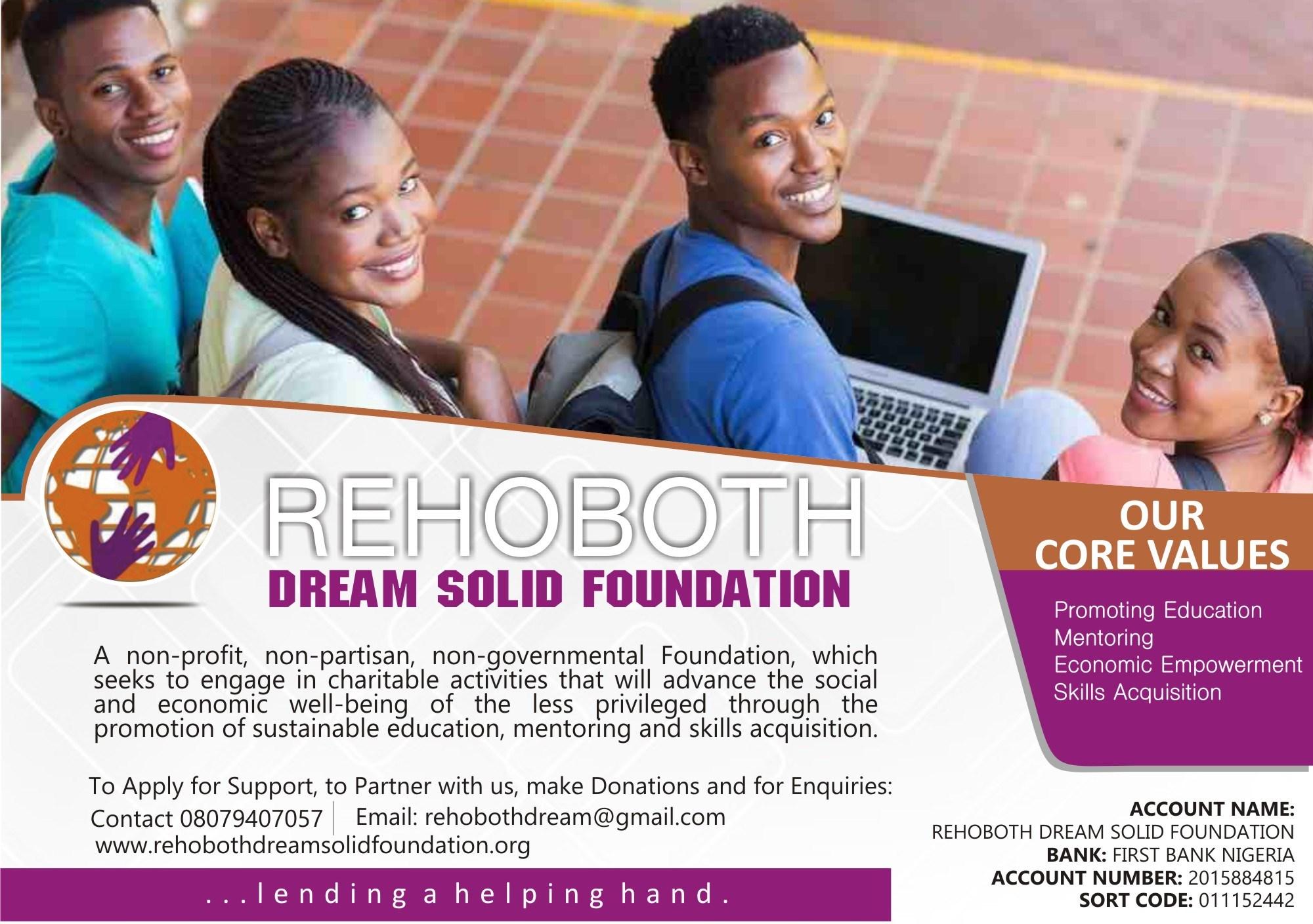
6. Volunteer
You can also volunteer your time and expertise by joining the RDSF team to carry out its daily operations and execute various projects across Nigeria. Most of these voluntary services can be done remotely.
36 A QUARTERLY MAGAZINE
R D S F
RDSF VOLUNTEER MRS MARTHA JESULEKE
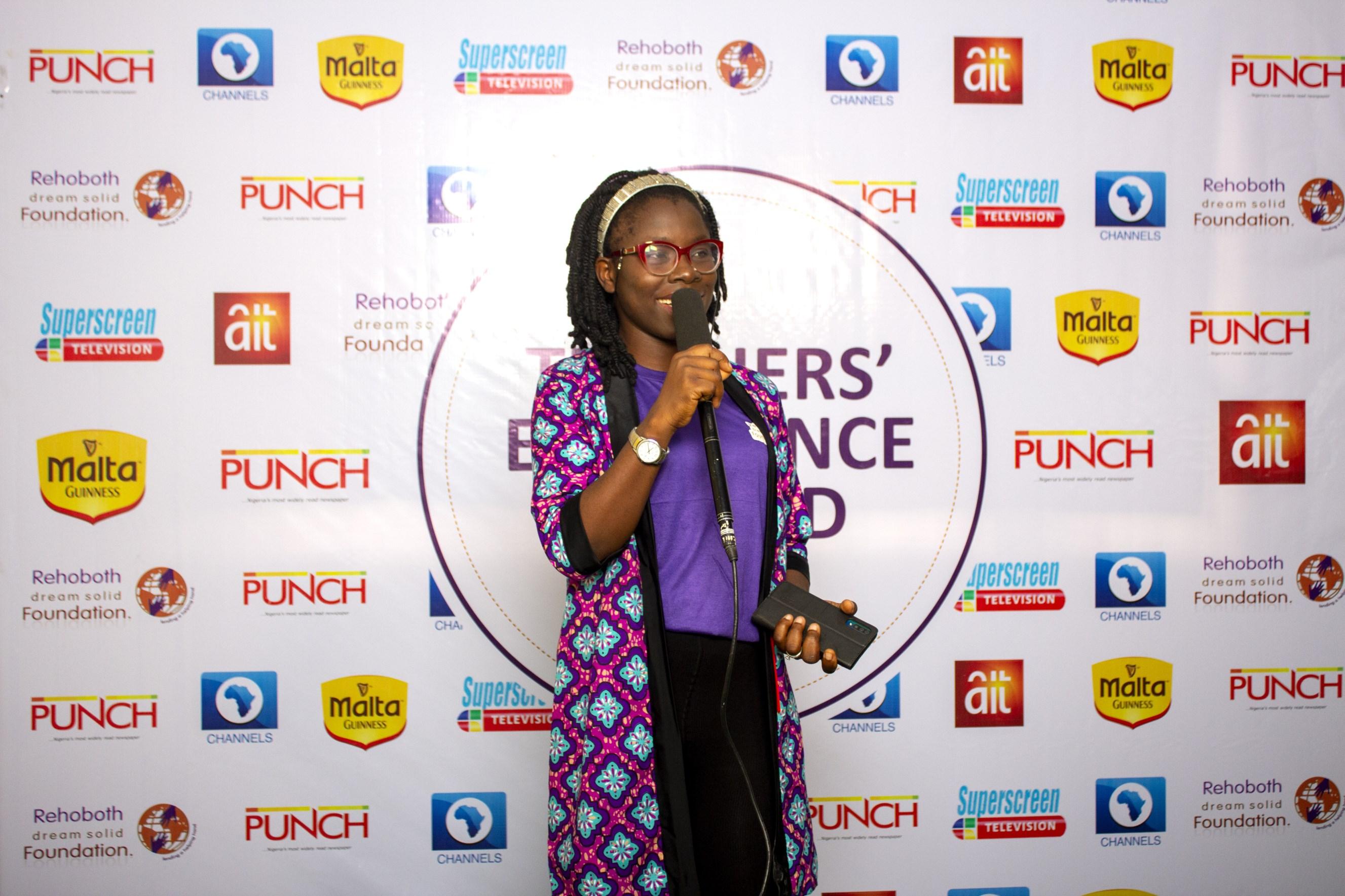
Kindly tell us about your background, family and education.
I was born in Akure, Ondo State, and I am the youngest child in my family. Unfortunately, I lost my father when I was barely three years old, which meant my mother had to single-handedly raise my siblings and me. Despite belonging to royal families on both sides, we faced various challenges along the way.
My mother has been my greatest role model, and observing her overcome numerous obstacles has inspired me to strive for success. Witnessing her reach the pinnacle of her career in lecturing, I have set ambitious goals for myself, aiming to achieve even greater heights.
I pursued my higher education at the University of Lagos, where I obtained a master's degree in Measurement and Evaluation in 2016. Additionally, I have acquired several certifications that have further enhanced my skills and knowledge. With a strong foundation in Education and a passion for continuous growth, I am only beginning to explore the vast possibilities that lie ahead of me.
“My mother has been my greatest role model, and observing her overcome numerous obstacles has inspired me to strive for success.”
Is there any way your upbringing has influenced your choice of charity?
Absolutely! The way I was raised has had a significant impact on my choice of charity work. My mother, who has always been a generous person, serves as the coordinator of the children's ministry in a denomination for more than three decades and has a genuinely caring nature that has inspired many others to help people in need.
Being a counselling psychologist, she strongly believes in giving back to the community, and one of the ways she contributes is by providing counselling services to those who require support.
Growing up in such an environment, I naturally developed a strong inclination toward helping others. It became effortless for me to help those in need.
Volunteering has become the most fulfilling way for me to make a difference and extend a helping hand to those who require it. The values instilled in me during my upbringing continue to guide my choices in the realm of charity work.
“Volunteering has become the most fulfilling way for me to make a difference and extend a helping hand to those who require it.”
THINKING ALOUD ISSUE 22 | APR - JUN 2023 | 37
R D S F
Many people know you as a teacher but you are quite more engaged with students outside the academic curriculum. Please share with us some of the initiatives and avenues through which you mentor young people.
Thank you for asking about my involvement with students beyond academics. Besides being a teacher, I actively mentor young individuals through multi ple initiatives. As the co-founder of "TheJesuleke," we connect secondary school students and leavers with mentors who help them prepare for life. Our platform matches students with experienced professionals from various fields, providing guid ance and valuable insights for their chosen careers.
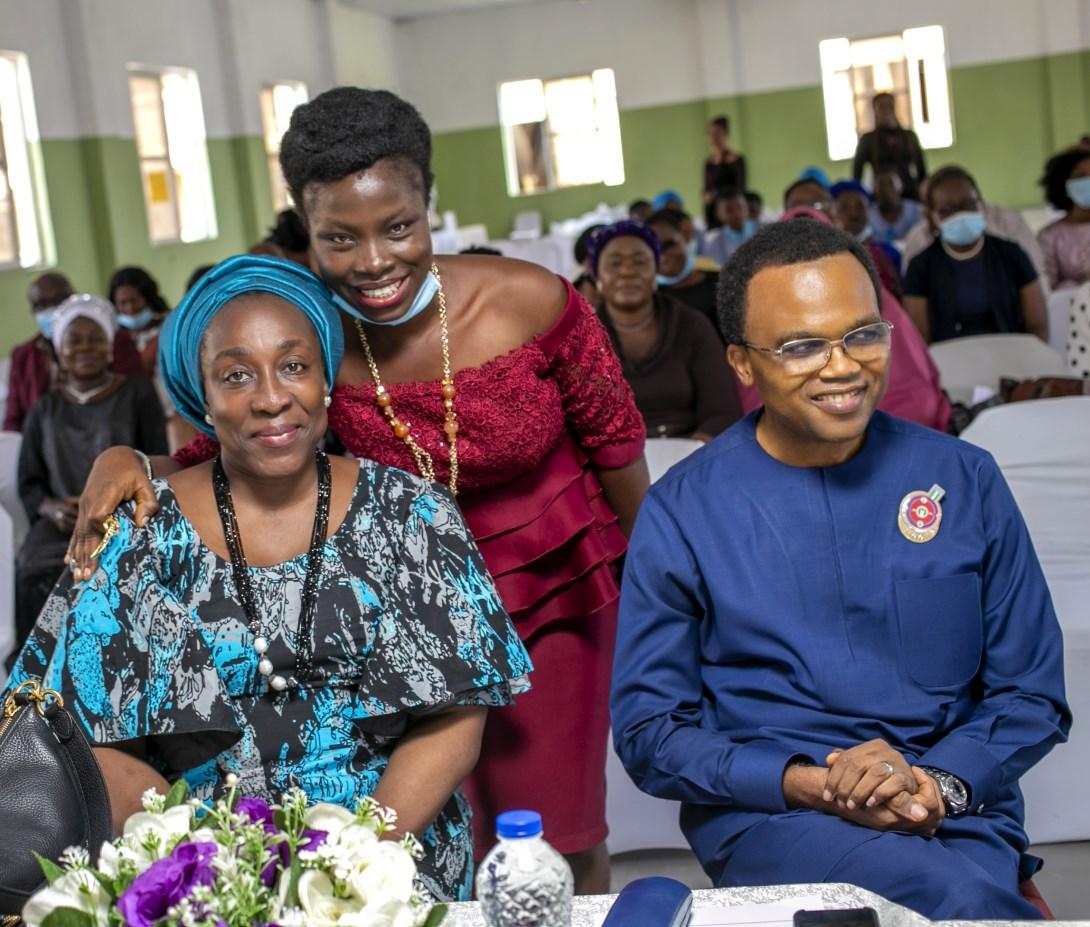
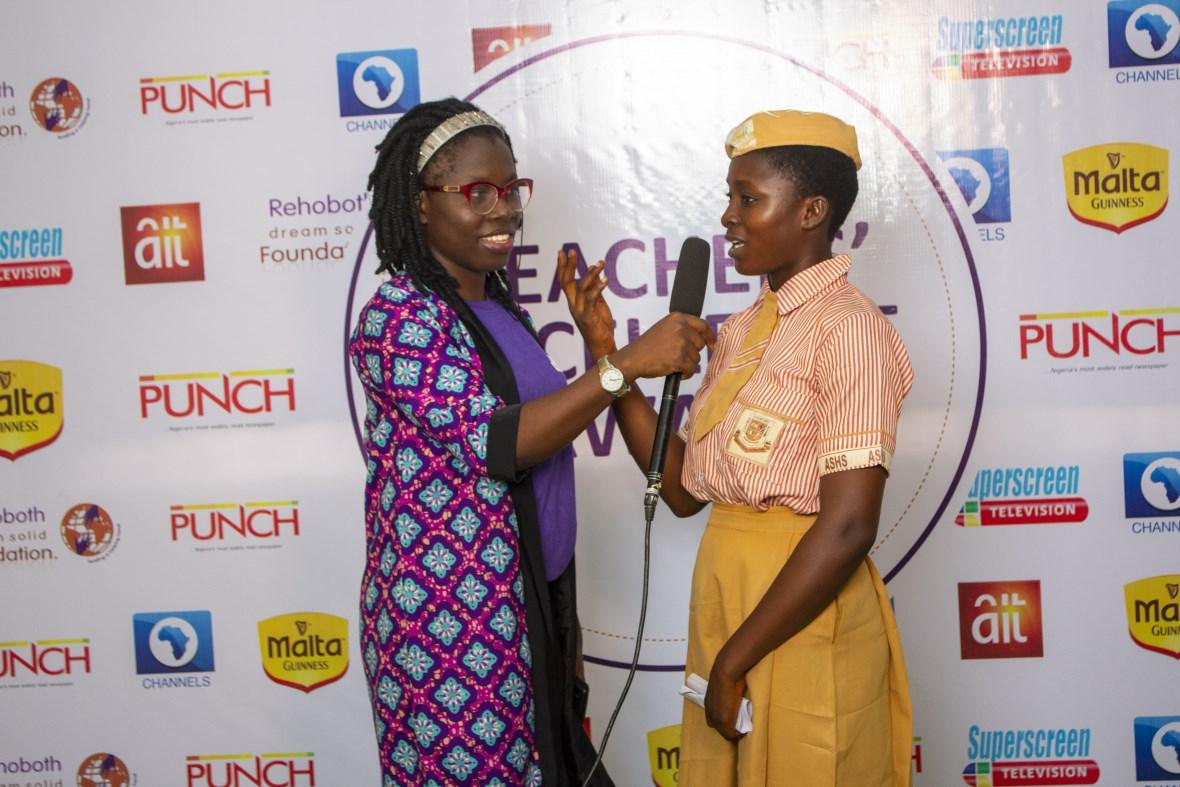
Additionally, we collaborate with organizations to train students on sustainable development, equip ping them with skills for a sustainable future. Workshops, seminars, and interactive sessions are organized to broaden students' horizons and develop vital life skills. Through these efforts, we empower students, contributing to their growth and a brighter future.
“
We admire your commitment as a volunteer at RDSF. What project would you consider the most emotional to you and why?
Thank you for acknowledging my commitment as a volunteer at RDSF. The most emotional project for me is the Teacher's Excellence Award. Gathering information about nominated teachers, I heard learners speak about the profound impact their teachers had on them.
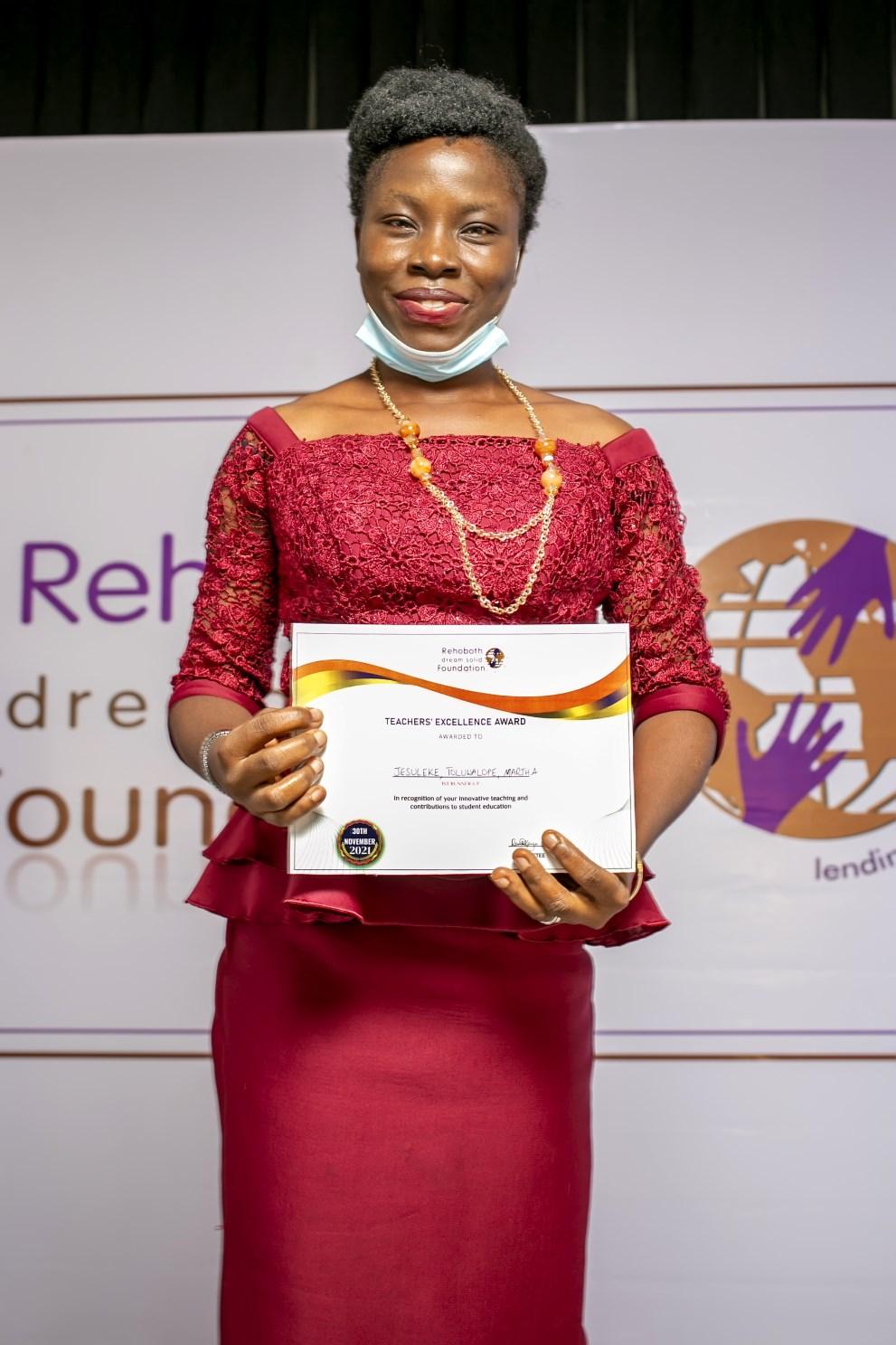
The stories shared were truly amazing and showcased the transformative power of education. Witnessing the deep connection between teachers and students and the genuine appreciation expressed left a lasting impression, reinforcing my passion for supporting education in our community.
“Thank you for acknowledging my commitment as a volunteer at RDSF. The most emotional project for me is the Teacher's Excellence Award.
How would you describe your experience as a volunteer at RDSF?
My experience as a volunteer at RDSF has been nothing short of life-changing. Being part of an unwaveringly dedicated team and contributing to projects that truly matter has been a profoundly rewarding journey. I have been privileged to witness the extraordinary impact RDSF has on our community firsthand, whether through initiatives like the Teacher's Excellence Award, Vocational trainings, or other transformative projects.
As a living testimony, having been honored as the 1st runner up for the Teacher's Excellence Award in 2021, I have seen the power of education to ignite profound change in individuals' lives. Connecting with learners and hearing their stories has both inspired and humbled me, reinforcing my unwavering belief in the paramount importance of giving back. This experience has ignited an unquenchable motivation within me to continue making a tangible difference in the lives of others.
A QUARTERLY MAGAZINE R D S F
Besides being a teacher, I actively mentor young individuals through
MrsJesulekeinterviewingastudentatthe2022 RDSFTeachers'excellenceaward.
MrsJesulekewithTrusteesatthe2021RDSF Teachers'excellenceaward.
OMOLOLA KOLAWOLE AN RDSF SUCCESS STORY
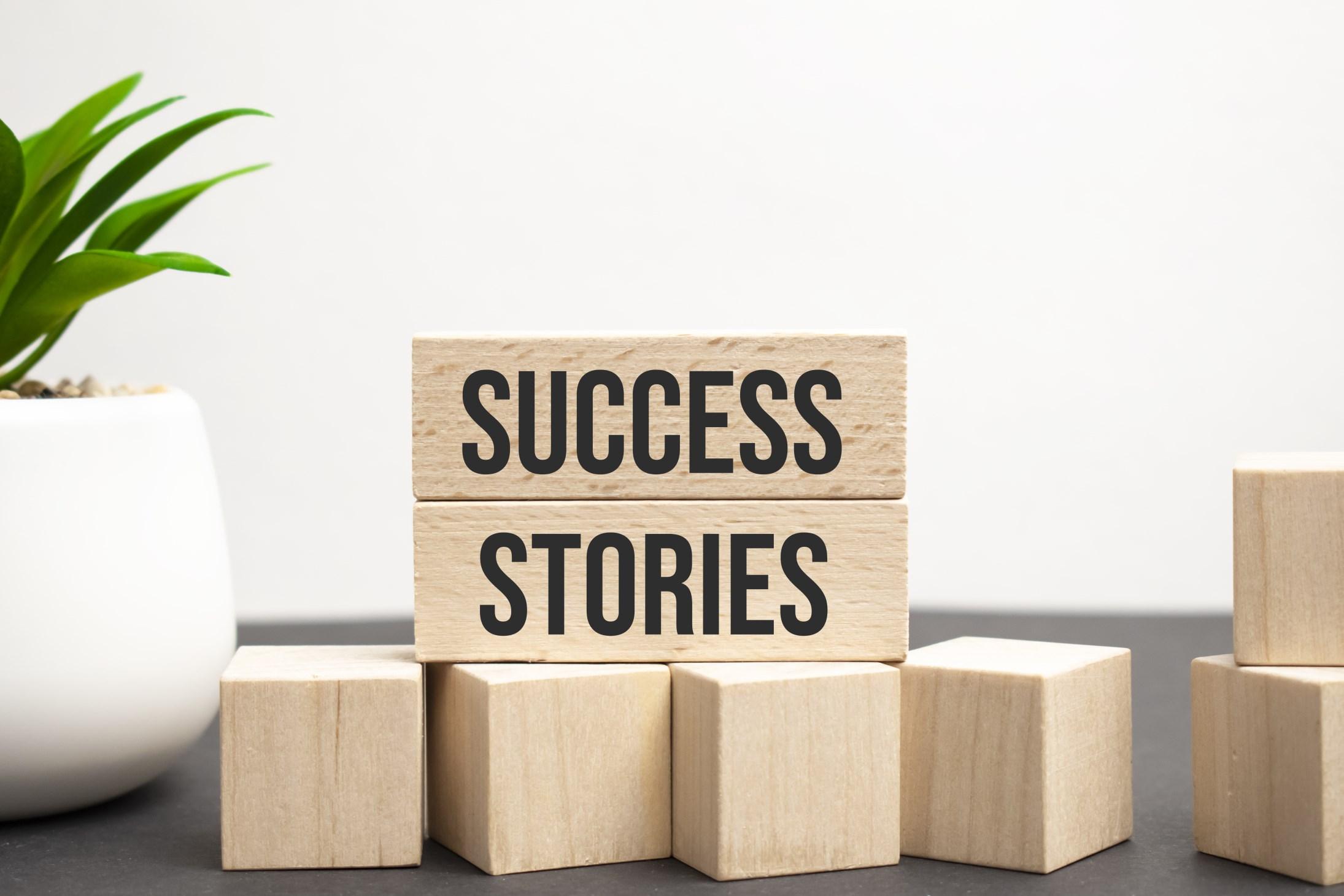
My name is Omolola Mariam Kolawole. I am from Ibadan, Oyo state, and I recently graduated from the Ladoke Akintola University of Technology, Ogbomosho. I hold a Bachelor of Technology in Agricultural Economics with a CGPA of 4.42/5.00. This is a dream come true for me. I am currently undergoing my oneyear mandatory National Youth Service in Oyo State, Nigeria. I also run a cake baking business in Ibadan.

MY FAMILY AND FINANCIAL BACKGROUND
I am not privileged to be born with a silver spoon. I am the first child of my parents and I have four siblings. I grew up in a family where eating could be difficult at times. My father is a commercial motorcycle rider, and he does not earn much. My mother on the other hand is a trader; who sells whatever she knows can put food on the family’s table.
“My father is a commercial motorcycle rider, and he does not earn much. My mother on the other hand is a trader; who sells whatever she knows can put food on the family’ s table.”
I can say that my mother is the breadwinner and caring for the whole family has been a big burden on her. I attended a private primary school but it got to a point when my parents had to withdraw me to a public primary school. This was a great challenge for me as I began to operate in a new academic environment with a lower standard of learning.
I could not blame my parents because the decision was induced by our financial condition and even as the first child, I made a lot of sacrifices just for my siblings to be educated too. There were times my needs were delayed or unattended to just for my siblings’ needs to be met.
MY ACADEMIC GOALS AND THE OBSTACLES I FACED
After secondary school in 2013, the thought of “what next?” started running through my mind. I checked my family’ s financial status, if they could afford to sponsor me to attend a university, but the probability was very low. I wrote my first WAEC examinations in 2012, while I was still in SS2 and I had great results. I passed all subjects even though I was yet to complete secondary school and in 2014, I got admitted into Ladoke Akintola University of Technology for a one-year pre-degree program. This was a challenging
for me and my family as there was no hope of paying my tuition, but my parents had to borrow and beg for money to pay the tuition. During my undergraduate days, in order to support my parents, I worked as a waitress at events in Ibadan even though I was schooling in Ogbomosho.
Anytime there was a break, I engaged myself by taking up menial jobs to help me raise money for foodstuffs and basic needs in school. I kept surviving this way till my second year in school.
HOW I MET RDSF AND THE SUPPORT I RECEIVED
In 2018, I had to change my hostel because I could no longer afford the rent where I stayed, and I knew my parents were under pressure to look for funds for my sister who had just gained admission into the university.
It was at this time that I met a neighbour; Eunice Olatunji now Mrs. Eunice Joseph. She was in her final year while I was in my second year and my room was just next to hers. I started moving close to her because I noticed we shared the same values.
THINKING ALOUD ISSUE 22 | APR - JUN 2023 | 39
R D S F
Her dedication and level of commitment to her academics was top-notch. Whenever I had an assignment from school, it was her phone I would borrow to do my assignments because I did not have access to any device connected to the internet.
There was this day, I was in her room, and during our conversation, she asked about my CGPA and I told her; I think she was impressed, from that day the bond became stronger.
I took her as my elder sister from the same parents. I started relating my challenges to her, my parents' condition, and how I was able to stay in school. She shared her own experiences and how she was able to break through.
“In January 2019, I applied for RDSF support and it was successful.
This was one of my biggest achievements because I never thought I could get support from anywhere. RDSF supported me from my third year till my final year in the university.”
From there, she introduced me to different scholarship bodies, as the applications were coming on stream, and I used her phone to apply. In July 2018, after so many attempts with negative responses from those applications, she told me about RDSF and how she and others have benefited from the Foundation.
In January 2019, I applied for RDSF support and it was successful. This was one of my biggest achievements because I never thought I could get support from anywhere. RDSF supported me from my third year till my final year in the university. This really means a lot to me, and I am grateful for it. I could
not have been where I am today if not for RDSF. At the point I was giving up they came through for me. RDSF made the rest of my journey in school seamless. It has always been my dream to pursue a Master’s degree abroad.
I give Glory to God because the dream has come to pass. I will be starting my Master’s degree at the University of Alberta, Canada, this September and my study visa has been approved.
This is a great milestone to achieving my career goal. Here I am today, the daughter of those poor parents, now traveling abroad to study. This achievement cannot be mentioned without acknowledging the great impact of RDSF.
“I give Glory to God because the dream has come to pass. I will be starting my Master’ s degree at the University of Alberta, Canada, this September and my study visa has been approved.”
MY ADVICE TO THOSE FACING SIMILAR CHALLENGES
While going through those challenges, I was driven by the desire to change my family’ s financial status. I decided in my heart that none of these challenges was going to define me, so I learnt not to give up. I
had a goal for myself and I envisioned the future I wanted even though it did not look possible. I knew that the only thing that can deter my success is to quit; even though so many times I felt like quitting, I still never gave up. My advice to those facing similar challenges in their family is to never quit.
“While going through those challenges, I was driven by the desire to change my family’ s financial status. I decided in my heart that none of these challenges was going to define me, so I learnt not to give up.”
It is never easy but education is still a pathway to break the vicious circle of poverty. It will not be easy but trust me you will overcome it. Also, wherever you find yourself, please be humble and respectful. Do not look down on anybody because who you think will help you might not even look at your side and the stranger next to you might be the one God has sent to you.
In conclusion, I would like to give glory to God who has brought me this far. I also appreciate my parents and every other person God has used to support me in one way or the other. My sincere appreciation goes to my mentor, Mrs. Eunice Joseph, who held my hands all through this journey.
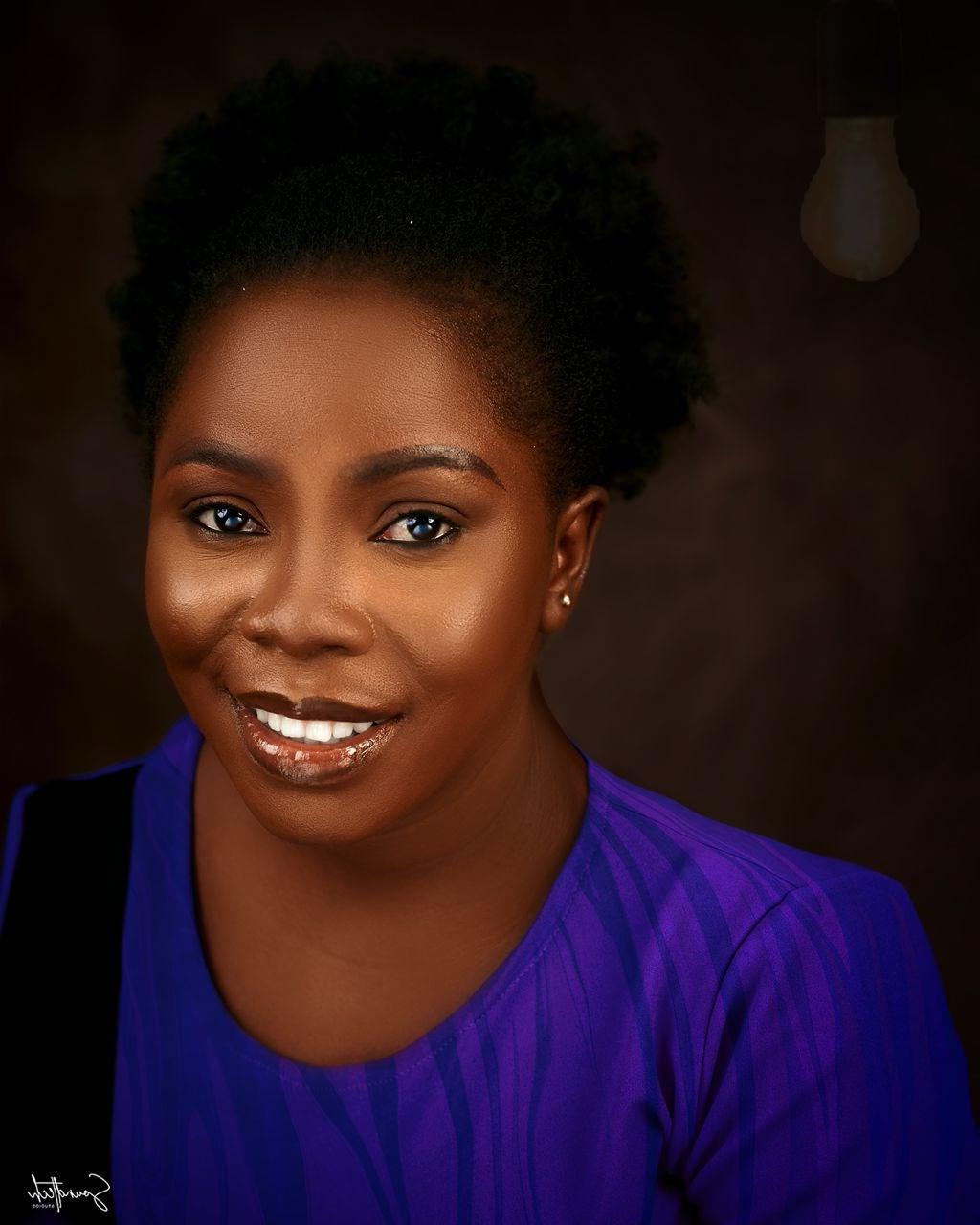
I really appreciate your kind gesture, and your timely advice and support, you are such a rare gem. Lastly, I appreciate the entire Board of Trustees of the Rehoboth Dream Solid Foundation, those who are working tirelessly behind the scene to help the younger generation get a solid education. Thank you so much.
God bless you and your entire family.
40 | A QUARTERLY MAGAZINE
R D S F

FITNESS SPOTLIGHT WITH MRS ‘YEMISI AYENI
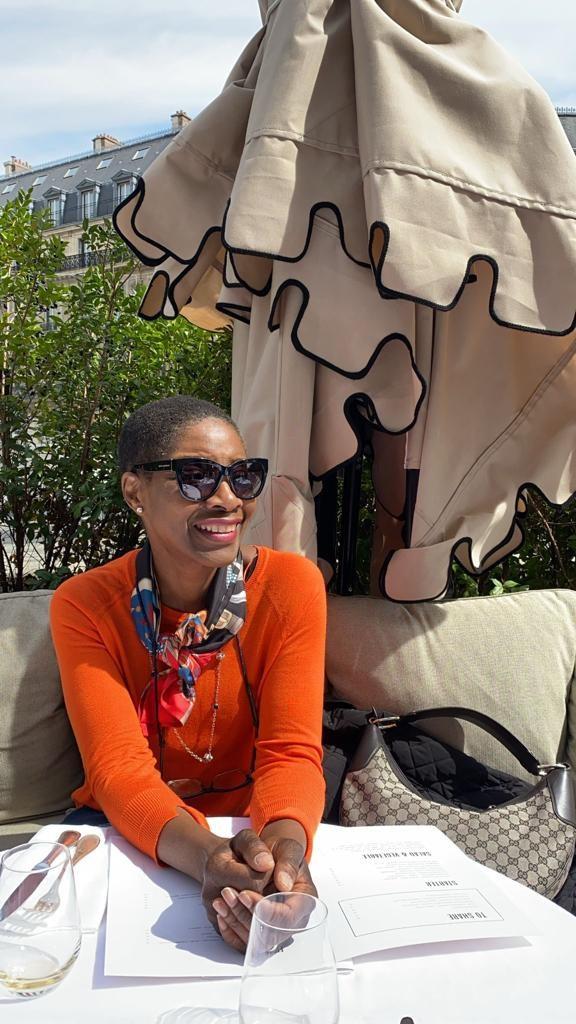
right after graduation, followed by 1 year in PW Lagos. After leaving PW, I spent 2 years as a partner in a consulting firm, before joining Shell Nigeria in 1994. I spent 21 years in Shell, doing a wide range of interesting jobs, retiring as Managing Director of the Pension Fund in2015.
“In my spare time, I love travelling (I especially enjoy cruises, which are a fantastic way to see the world), reading (though I don’t read as much as I used to) and doing puzzles (crosswords and Sudoku).”
In my spare time, I love travelling (I especially enjoy cruises, which are a fantastic way to see the world), reading (though I don’t read as much as I used to) and doingpuzzles(crosswordsandSudoku).
What does ‘living healthy’ mean to you?
The term ‘living healthy’ means being keenly aware of the need to live a balanced life, and incorporating this balance into my daily life. One of my guiding scriptures is 1Corinthians3:16 “Doyounotknowthatyouarethe templeofGod,andthattheSpiritofGoddwellsinyou?”
As a Christian, I believe the bible is the breathed and inspired word of God, and I take it seriously. So, my
THINKING ALOUD ISSUE 22 | APR - JUN 2023 | 42
R D S F
belief that my body is a temple of God housing the Holy Spirit,leadsmetoseektolookafteritbylivinghealthy.
When did exercise become a routine for you and how did you start your fitness routine?
I started exercising regularly in my mid-20s, when I movedbacktoNigeriafromtheUK.
I was quite chubby in primary school, and apart from compulsory school PE lessons, the only exercise I did was swimming, but to be honest, this was more for fun than for exercise, more marco polo, than laps! By age 10 when I started secondary school, I had lost all the puppy fat, and through secondary school and university, I didn’t do much exercise. Like many slim people erroneously believe, I didn’t see the need to exercise, as I didn’t have a weight problem. However, even though I didn’t do any formal exercise, I’ve always been a very active person, and so I wasn’t leading a sedentary life. I first joined a gym when I was working in PW London, but my attendancewasrathersporadic!
It was after I returned to live in Nigeria aged 25 that I started exercising regularly, attending aerobics classes. My return to Nigeria ushered in the start of an intensely traumatic period, with my beloved mother going home to be with the Lord within 6 weeks of my return. On reflection, I think I turned to exercise as a way to help me cope during this period. I found that a good aerobics session tired me out, released much-needed endorphins, and helped me sleep better, and so I went regularly. In the intervening 32 years, I have continued to exercise regularly.
“Like many slim people erroneously believe, I didn’t see the need to exercise, as I didn’t have a weight problem. However, even though I didn’t do any formal exercise, I’ ve always been a very active person, and so I wasn ’t leading a sedentary life.”
How often do you work out and what is your workout routine like?
On average, I work out 2-3 times a week. For the past 5 years, I’ve been a member of an African-inspired fitness club, that offers a range of classes (dance, toning, flow), online and in the studio. Prior to Covid, we had the classes in our home gym 4 times a week, but the classes went online during Covid, and I’ve remained with the online option since. Over the past 2 years, I’ve also been taking golf lessons; and in the past few months have finally “graduated” from the range to the golf course.
Going on the course means at least 3 hours of brisk walkinginthefreshair,andisagreatformofexercise.
How important are food choices in your fitness journey? How do you balance eating healthy and working out?
I love working out and I also love food, and to be honest I would rather work out than deprive myself of food. I have a sweet tooth, and will usually have dessert if I go out for a meal and if there’s chocolate at home, I will definitely eat it! But, having said that, I generally eat quitesensibly.
Luckily, I actually enjoy fresh fruit and vegetables, so having a green-vegetable smoothie or a large saladaren’t things I have to force myself to do, they are things I enjoy. Also I don’t drink alcohol or soft drinks, two areas where it’s easy to pile on empty calories. I drink a lot of waterandusuallyhaveabottlewithme.
A few years ago, an elderly gentleman who I admire greatly (he is now 103) told me that one of his life mottos is “everything in moderation”, and he illustrated this by saying that he would have a glass of red wine, but not the bottle; a square of chocolate but not the whole bar etc. I think thisis excellentadvice,andI havetriedtoadoptit.
Many people struggle to stay motivated and keep to their fitness routine. How do you motivate yourself on days when you do not feel like working out?
I really enjoy working out, so it’s not a challenge to stay motivated. The challenge I have is when I simply can’t find the time to work out because of other commitments. For example, I was traveling a fair bit in May, and ended uphardlyattendingmy fitness classes.
Now whilst I remained active, and was doing other forms of exercise and exceeding my 10,000 daily steps goal most days, I really missed the routine of my classes, and I wasgladtoresumewhenI gotback.
My advice to people who struggle to stay motivated to keep to their fitness routine, is to keep searching until theyfindaformofexercisethattheyenjoy.
Someone I know who loves dancing used to struggle to go to the gym, until one day her husband said, why not just put on music and dance? And that’s been her daily exercise routine since then, she dances for 45 minutes every morning; at the end of which she is pouring with sweat and energized for the day. Exercise comes in all shapes and sizes. If it’s walking you enjoy, then take a briskwalkandusethatasyourexercise.
43 A QUARTERLY MAGAZINE
R D S F
We all have a finite number of waking hours every day and we need to juggle to fit in what’s important to us, in a way that works with our lifestyles. For example, when our daughters were younger, my main exercise was swimming with them at the weekends. I had a full-time job, and there was no way I was going to come home in the evenings and head out to the gym. So I spent my evenings with them, and when they were having their swimming lessons on a Sunday, I did my laps at the same time. In addition, for the past 20 years, we’ve lived in houses with a lot of stairs,so really even the daily activity of moving round the house, already gives me a decent workout!
“...when our daughters were younger, my main exercise was swimming with them at the weekends. I had a full-time job, and there was no way I was going to come home in the evenings and head out to the gym.”
Can you share three essential tips that make your workout routine effective?
1. I take my workout sessions seriously, I recall working out with a friend once, and she was so amused at how seriously I was taking it, she was like “are you going to do an exam at the end of it?”. I’m not one to spend half the class checking my phone and kidding myself that I’ ve done a 1-hour class. I diligently follow the routines from the start of the class until it is over. Another of my guiding scriptures is Colossians3:23 “Whateveryoudo, workatitwithallyourheart,asworkingfortheLord, notforhumanmasters”. That’s my philosophy with my workandalsowithmywork-outsessions.
2. I see working out as a gift I’m giving myself, so my attitude isn’t that I’m being compelled to do something I don’t want to do, and I’m doing it grudgingly. My attitude in a work-out session is gratitude to God that I’m able to move about easily, and that God has blessed me with good health such that I’m able to give myself the gift of a healthy lifestyle. Over the years, I’ve had very dear family members/friends who’ve suffered serious illnesses; and I know what they would have given to be able to get up and do a dance class or swim a few laps. So I know without a shadow of doubt, that being well enough to work out is truly a privilege, and I don’t take itlightly.
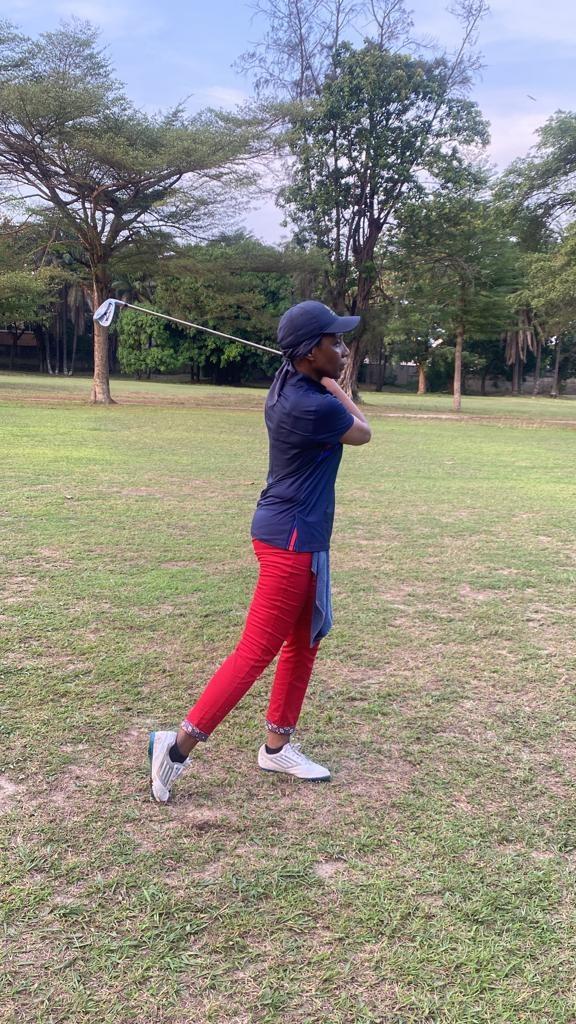

Busy executives can they re-purpose a spare office into a gym, and arrange evening fitness classes at work, that staff can also attend?; can they wake up 1 hour earlier and work out before they start work? can they watch less TV and work out instead?, or can they put the treadmill infrontofTVandwalkwhenwatchingTV?
Basically, the solution will differ between individuals, but if there is commitment to staying fit, then I believe that everyone can find a creative way to fit it in. The benefits ofbeingfitareenormous,andworththe effort!
3. Finally, I ensure that the exercises in my workout routines are activities that I enjoy. I sometimes played squash with my parents as a child, I didn’t enjoy it; and I knew that racquet games weren’t my idea of fun, and so I didn’t turn to them when I started exercising regularly. On the other hand, I started swimming as a toddler, and have fond memories of swimming regularly at Ikoyi Club with my mother and brothers through my childhood, and swimming has remained a part of my fitness regime over theyears.Basically,working outshouldbefun!
THINKING ALOUD ISSUE 22 | APR - JUN 2023 | 44
R D S F
CULTIVATING A PRODUCTIVE AND SUPPORTIVE ENVIRONMENT
by Omon Anenih
well-being. By offering EAPs, businesses demonstrate a commitment to their employees' holistic health, ensuring they have the necessary support to thrive both personally andprofessionally.
“Dedicated rest spaces within the workplace can significantly contribute to employee well-being. These areas, equipped with comfortable seating, soothing aesthetics, and a quiet atmosphere, provide employees with a space to unwind and recharge.”
In today's fast-paced and demanding work culture, prioritising employee well-being has become an essential aspect of running a successful business. A healthy workforce not only contributes to increased productivity but alsofostersapositiveworkenvironment.
In this article, we will explore various strategies to promote workplace wellness, with a particular focus on the importance of creating a safe physical and emotional environment, implementing employee assistance programs, providing adequate rest spaces, encouraging movement and exercise, embracing work-life balance, and promotingteambondingandindividualrecreation.

CreatingaSafePhysicalandEmotionalEnvironment.
Asafephysicalandemotionalenvironmentis thefoundation of workplace wellness. Employers should prioritize creating a culture of respect, empathy, and open communication. This includes implementing policies against harassment, discrimination, and bullying. Additionally, fostering a supportive work environment that encourages collaboration, teamwork, and healthy relationships amongemployeesiscrucial.
ImplementingEmployeeAssistancePrograms.

Employee Assistance Programs (EAPs) provide valuable support for employees facing personal or work-related challenges. These programs offer confidential counseling and resources to help employees manage stress, mental health issues, and other difficulties that may affect their
RestSpacesforRejuvenation.
Dedicated rest spaces within the workplace can significantly contribute to employee well-being. These areas, equipped with comfortable seating, soothing aesthetics, and a quiet atmosphere, provide employees with a space tounwindandrecharge.
Encouraging short breaks throughout the day can enhance productivity and prevent burnout. Companies can also incorporate meditation rooms, relaxation zones, or wellness corners, where employees can engage in mindfulness exercises, deep breathing, or simply take a momenttorelax.
StrategicPlacementofKeyUtilities.
Encouraging movement and physical activity is crucial for maintaining a healthy workforce. Strategically locating essential utilities like printers, copiers, and water dispensers away from employees' immediate workstations can promote regular movement. This simple adjustment encourages employees to get up, stretch their legs, and engage in brief physical activity, reducing sedentarybehaviorandenhancingoverallwellness.
“Strategically locating essential utilities like printers, copiers, and water dispensers away from employees' immediate workstations can promote regular movement.”
45 A QUARTERLY MAGAZINE
R D S F
ShortandFocusedMeetings.
Meetings arean integral partof workplace dynamics, but theycanbecometime-consumingandcounterproductive. Encouraging shorter and more focused meetings can improveemployeewell-being by minimising stress, enhancing productivity, and allowing employees to allocate time for other essential tasks. Employers should strive to establish clear agendas, set time limits, and encourage effective communication to ensure meetings remain efficientandpurpose-driven.
EmbracingWork-LifeBalance.
Maintaining a healthy work-life balance is essential for employees' overall well-being and satisfaction. Encourage employees to prioritise their personal lives by promoting flexible work hours, remote work options, and theuseoftechnology thatallowsforhybridworkmodels.


By supporting work-life balance, employers demonstrate their understanding of employees' individual needs and foster a culture that values personal time and promotes holisticwellness.
PromotingPlayandRecreation.
Encouraging play and recreation both individually and collectively can have a positive impact on employee wellbeing. Employers can provide recreational spaces such as game rooms, outdoor areas, or fitness facilities where employees can engage in activities like sports, games, or exerciseduringbreaks.
Organising team-building exercises, wellness challenges, or social events can also foster a sense of camaraderie, relieve stress, and boost morale. Recognizing the importance of leisure and recreation helps create a more positivework.
“By supporting work-life balance, employers demonstrate their understanding of employees' individual needs and foster a culture that values personal time and promotes holistic wellness.”
Conclusion
Prioritising workplace wellness is not only a moral imperative but also a strategic decision that can contribute to the success and profitability of a business. By creating a safe physical and emotional environment, implementing employee assistance programs, providing rest spaces, encouraging movement and exercise, embracing worklife balance, and promoting play and recreation, employerscanfoster acultureofwell-being.
When employees feel supported, valued, and empowered to prioritize their health, they are more likely to be productive, engaged, and loyal. Investing in workplace wellness not only benefits individuals but also lays the foundation for a healthier, happier, and more prosperous business inthelongrun.
“When employees feel supported, valued, and empowered to prioritize their health, they are more likely to be productive, engaged, and loyal.”
THINKING ALOUD ISSUE 22 | APR - JUN 2023 | 46
R D S F
I ONCE SUFFERED FROM LOW SELF-ESTEEM by
Evi Idoghor

Thus,myworthor howI judgedpeople's affectionfor me was through my performance. If they didn't "love" me, it was because I lacked something. I found myself in a perpetual battle in my relationships over the years. I attempted to become someone I wasn't to please some people, just to be accepted at the time. When they eventually rejected me, it eroded my self-esteemperhaps I wasn't good enough, clever enough, or pretty enoughforthem,I reasoned.
I've carried these wounds with me, burying them beyond 6 feet just to have them resurface when humans show me that they are just that - humans. It wasn't until I wrote down my feelings and forwarded them to a friend that he asked, "What's wrong with you?!? Do you not realize you are a child of God?" That compelled me to delve within andfindwhy I saw myselfinthis way, aswellas where all ofthepaincamefrom.
may stem from our upbringing. For example, when you did something wrong and someone told you that you weren't going to amount to anything, or when you failed a school test and you remember the look of disappointment on your parents faces, then you said to yourself - I amnevergoingtoamounttoanything,Iamafailure.
Thus, this narrative has followed you over the years like a dog neatly tethered to your hand. Most of the time, you forget it's even there; until something triggers it and it barks, at which point you appease it with anything or distractitfromwhateverpromptedit.
An occurrence in my life recently prompted me to reconsider how I value myself and where I lay my selfworth. It dredged up old insecurities that hover over my life every now and again when something begins to go a certain way without my permission. If someone rejected me (romantically), the mocking voices in my head would tell me it was because of the way I looked. If my family members ignored my advice, they would remark, "It's because you don't make enough money like so and so, whichiswhytheydon'trespectyou."
Many of us associate our identity and self-worth with our job, who we are in a relationship with, our material possessions, our sexual preferences, our marital status, how much we are needed by others, and the list goes on. Weutilize all of these things as copingmethods to fillthe emptiness in our lives. So much so that when these things fail, we lose ourselves, as if there was nothing else tolivefor.

Can I just emphasize that these are lies/deceptions from the enemy? There is a creator who created us, and he is the one who has given our lives all the worth they will ever require to function properly. It makes no difference whether you are rich or poor, sick or healthy, disabled or not, earn a six-figure salary or minimum wage; Jesus has alreadygivenusourself-worthand/orvalue.
If he didn't think we were valuable to him, he wouldn't have given his life for us. He not only did that, but he also gave us his spirit. If we put our self-worth or identity in the hands of others who are also trying to figure out who they are, or in things that cannot genuinelysatisfy,wewillendupindisaster.
47 A QUARTERLY MAGAZINE
“If someone rejected me (romantically), the mocking voices in my head would tell me it was because of the way I looked.”
R D S F
intricatelywoveninthedepthsoftheearth.Youreyes sawmyunformedsubstance;inyourbookwerewritten, everyoneofthem,thedaysthatwereformedforme, whenasyettherewasnoneofthem.–Psalm139:13-16
I love the last sentence of this text because it demonstrates God's intentionality with us. Notevenourparents can plan out our entire lives once they find out they are pregnant, and not even you, who gets to live that life can have everything sorted out at any moment. This chapter of scripture is similarly related to one found in Jeremiah, in which God speaks to a young lad, telling him that he knew him before he was placed in his mother's womb. If God knew us, deliberately created us, and planned our days before we were ever formed, we can deduce that our self-worthmustderivefromhimaswell.
The psalmist speaks brilliantly about how God formed him on purpose. He understands that his life has meaning and that he was not an afterthought in God's thinking. That is how God created us all; he was the one who gave us life, his breath, and, most importantly, his spirit. Not our jobs, spouses, partners, children, communities, money, or other possessions. When we realize this, we will be more secure in who he created us to be so much so that if a disappointing situation arises, we will not think it is because we are worthless; instead, we will attribute it to one of life's unpredictable circumstances.
Godseesusdifferently

I'm reminded of the story of Gideon, who was perfectly content with a less-than-average life. According to his narrative in Judges, when the angel of the Lord appeared to him, he addressed him as "Mighty man of valor,"
When I am faced with a hardship, I often pray to God for a glimpse of hope, something to hang onto, something to show me that all will be well. Thank God, he sometimes indulges me like he did Gideon. However, those requests frequently stem from a lack of faith, from impatience, failing to recognize that difficult situations arise to teach us something about ourselves, and perhaps to save us from destructive patterns. So, as the book of James puts it, it is better for patience to have her perfect work, so that when we are finished with that trial, we will be whole and complete, lacking nothing, and confident in whoGodhasmadeustobe.

THINKING ALOUD ISSUE 22 | APR - JUN 2023 | 48
aheadofhim.
R D S F

THE SLAP HEARD AROUND THE WORLD
by Richard Sole
he was in a wheelchair and neck braces was just as sensational.
Then there is the slap recently heard around the world. Afrobeat musician Seun Kuti, a scion of the late popular Afrobeat maestro, Fela Anikulapo Kuti, caught on camera striking police personnel in the face. And the dispute between the popular Arise Television journalist Rufai Oseni and policemen in Lagos in 2022 over alleged floutingofroadtrafficregulations.
These are prominent cases no doubt. However, several other incidents of breakdown in PCR have gone unreported and they subsequently fall off the radar of public notice. Nevertheless, these conducts are disturbing, it devastates our community, and it erodes the community’s trust in police work. They are tragic eventsborne ofaflawedsystemofpolicing.
We highlight Rumsfeld’s phraseology with a spotlight on the known unknowns. There are some things we do not know. However, what we do know is that there are multiple high profile police community incidents of the recent past that highlight a collapse of PoliceCommunity Relations (PCR) and subsequently puts the issue of policing front and center on the community relations spectrum. Here we discuss this phenomenon andproffersolutions.

For example, in October 2020, a series of mass protests erupted across several cities across Nigeria against police brutality with the hashtag #Endsars. The Special AntiRobbery Squad now disbanded, was a notorious unit of the Nigerian Police Force with a long record of abuse directed at Nigerian citizens. The protest led to the killings of protesters by security operatives, destruction of properties by protesters, and the killing of twenty-two police personnel. The emotional toll of its aftermath carvedatraumaonournation’spsyche.
Take the case of former Nigerian Senator Dino Melaye’ s arrest, restrained in the back of a Toyota Hilux pick-up truck in March 2018, or the ‘Ramboesque’ arrest of former Governor Rochas Okorocha in 2022. Defying their orders to surrender, a combined team of security operatives charged his residence while he livestreamed the drama on social media. The arrest of ‘Peter-theRock’, ex-Governor Peter Ayodele Fayose in 2018 while
This poor perception of the Nigerian Police is further corroborated by the World Internal Security and Police Index (WISPI) which measures indicators of internal security worldwide and ranks countries according to their ability to provide security services. The WISPI examines four domains of internal security: capacity, process,legitimacy,andoutcomes.

The Nigerian Police Force was scored low on account of major gaps in these critical domains. This suggests an erosionofpublictrustintheNigerianPoliceForce.
We observe that police work is difficult and that many police personnel perform the difficult work of policing with professionalism, courage and respect. On a daily basis the work is extremely strenuous and often very dangerous. Their responsibilities are enormous and could not be more important. They are asked to keep our communitysafeandensureequaljustice underlaw.
“For our police to succeed, we must provide them with clear policies and consistent training that explains and enforces their responsibilities under the law. So that they may do their jobs to the highest professional standards.”
50 A QUARTERLY MAGAZINE
R D S F
For our police to succeed, we must provide them with clear policies and consistent training that explains and enforces their responsibilities underthe law. So thatthey maydotheirjobs tothe highestprofessionalstandards.
This is an important step toward providing our police force with the support and resources they need to do their job effectively and lawfully to achieve meaningful anddurablereform.
Whereas corruption, high crime rate, lack of fairness, excessive use of force and oppressive policies are identified as factors responsible for the negative perceptionoftheNigerianPoliceForce.
This broad perception of a flawed system emanates from the public from where the police draw recruitment. There is the belief that the Police are corrupt and abusive, and such abuses impair constitutionally guaranteedrights.
“There is the belief that the Police are corrupt and abusive, and such abuses impair constitutionally guaranteed rights.”
If we fix the organizational culture of the police force, a symptom of a wider societal illness, our remedy could possibly serve as a model for state governments, cities, police commands and community members to work togetherforeffectivepolicing.
“Transformational change is an important agent to keep inmind.”
The4domainsofWISPI; ‘Capacity’, thereare219police personnel for every 100,000+ citizens. A police force strength of about 350,000 personnel compared to its population of over 213.4 million. (2021) This is significantly below the 300 per 100,000 people standard recommended. Similarly, the homicide rate is in the region of 20 per 100,000 of the population. This is equallysignificantlyhigherthanthemedianrate.
Regarding the Process domain, there are numerous instances of long-drawn-out processes and subversion of judicial processes. We institute relevant process reevaluation to help shape reform and enhance success. WISPI legitimacy credo is questionable and Nigeria’ s score on WISPI outcomes are minimal. But we must be committed to creating the kind of police force that every Nigeriandeserves.

Here are some measures with input from residents, community members, religious leaders, city staff, human rights advocates, legal advocates, and many others who want a police force that serves them better. It may require that police commands meet specific goals under Federal Government oversight and may further require reformstobeoverseenbyanindependentmonitor.
They provide a framework for public safety, build on trustandcomplywithfederallaw.
THINKING ALOUD ISSUE 22 | APR - JUN 2023 | 51
R D S F
a. Community Policing. Community policing is a strategy that involves law enforcement officers working closely with members of the community to identify and solve problems together. This approach can help to build trust between police officers and community members. By engaging with residents, police officers can better understand the security concerns and work together to findsolutions.
b. Training. Training is another important factor in improving police community relations. Police officers should be trained on how to interact with people from different cultures and backgrounds. They should also be trained on how to de-escalate situations and use nonviolent methods to resolve conflicts. This can help to reduce the number of violent encounters between police andcommunitymembers.
c. Accountability. Accountability is crucial to improving police community relations. Police officers who engage in misconduct should be held accountable and publicly too for their actions. This can include disciplinary action or criminal charges. When police officers are held accountable for their actions, it sends a message that the community's trust is valued and that the police force is committed to maintaining public safety in a fair and just manner.
d. Communication. Effective communication is essential to building trust between the police and the community. Police departments should make an effort to communicate with community members regularly. This can be done through community meetings, social media, or other means. By keeping the community informed about police activities and initiatives, they can help to build trustandfosterasenseofpartnership.
e. Diversity. The Police force and its commands should strive to be representative of the communities they serve. This means hiring officers of diverse backgrounds and experiences. Diverse police departments can help to build trust with the community by demonstrating that they understand the unique needs and concerns of each communitymember.
f. Improvements in Criminal Justice Administration. Improvements incriminaljustice administrationis key to some of the perception deficits. This can be explored via reduction in trial length, prevention of incarceration without trial, as well as provision of free legal representation (at public expense) for accused persons who do not have the financial means to engage legal counsel by themselves.
patrol vans, arms and ammunition, ballistic protection equipment, crowd control equipment and other vital ancillary equipment would need to be provided for the Police.
Of course, it is understood that the financial burden might be too much for the Federal Government of Nigeria, this therefore calls for some form of private sector collaboration and engagement. Equally important is the provision and funding of overhead requirements such as fuel for vehicles, stationery, internet facilities andrunning costforpoliceoperations.

“Of course, it is understood that the financial burden might be too much for the Federal Government of Nigeria, this therefore calls for some form of private sector collaboration and engagement.”
In conclusion, improving police community relations is a complex issue that requires a multifaceted approach. By implementing community policing strategies, providing adequate training, holding police officers accountable for their actions, communicating effectively with the community, and striving for diversity, police commands can build trust with the communities they serve. By working together, law enforcement and community memberscancreatesaferandmorejustcommunities.
We have the resolve to make fair and lawful policing a reality for our country. I hope we provide a starting framework to improve public safety, build community trustandcomplywiththe constitutionandfederallaw.
g. Improved Infrastructure and funding of the Police. Critical infrastructure such as communication systems,
52 A QUARTERLY MAGAZINE
R D S F
SHIFT FROM A CULTURE OF CONVENIENCE TO SAVE HUMAN AND PLANETARY HEALTH
2015 and is expected to double by 2050. In its life cycle, plastic could emit 19% of global greenhouse gas emissions by 2040. Single-use plastics account for about 40% of current plastic production and about 98% of single- use plastic products are produced from fossil fuel, or "virgin" feedstock. Single-use plastic products like water bottles, straws, polystyrene plates – have become convenience in our modern lives. This convenience is killingusandourplanet.
“Single-use plastic products like water bottles, straws, polystyrene plates – have become convenience in our modern lives.
in developing countries with poor solid waste managementsystems.
Most plastics never fully disappear. Sunlight, wind, and wave action break down plastic waste into smaller pieces. These microplastics can enter the human body through inhalation and absorption and accumulate in organs. Microplastics have been found in lungs, livers, spleens, kidneysandintheplacentasofnewbornbabies.
”

This convenience is killing us and our planet.
About 36% of all plastics produced are used in packaging and less than 10% of plastics that have been produced has ever been recycled. The rest has been incinerated, landfilled, or littered. Plastic wastes can be found clogging drainages and providing breeding grounds for
Plastic microfibers have been found in drinking water and drifting through the air. Plastics are complex, highly heterogeneous materials consisting of about 13,000 chemicals. Plastics-associated chemicals, such as methyl mercury and bisphenol A (BPA) can be absorbed by the body.
They are harmful to early childhood development, exposure of children to phthalates in plastics causes decreased fertility in male adults. Many toxins in plastics have been linked to cancers, birth defects and immune system problems. The current patterns of plastic

THINKING ALOUD ISSUE 22 | APR - JUN 2023 | 53
R D S F
production, use, and disposal are not sustainable and are responsible for significant harms to human health, the environment, and the economy as well as for deep societal injustices (see The Minderoo-Monaco CommissiononPlasticsandHumanHealth).


Globally, about 8million tonnes of plastic enter the ocean annually from mismanaged waste at coastlines. More than 90% of all birds and fish are reported to have plastic particles in their stomach and millions are killed every year because of entanglement or starvation caused by plastics. By 2050, if things don’t change, the plastic waste in the ocean will outweigh the fish. Plastic pollution is not just a waste management issue, but it is a health, environmental justice, and human rights issue.
• Curb plastic pollution by limiting consumption, generating less waste, avoiding single use plastics and unnecessary plastic products. Support recycling schemes‘’If you can’t reuse it, refuse it’’. Put pressure on manufacturers to phase out microplasticsinconsumerproducts.
• Businesses to innovate and eliminate unnecessary plastic packaging, and industries to move away from harmful plastic production toward circular economiesonplastics.
• International measures such as a legally binding Global Plastics Treaty that is grounded in robust science.
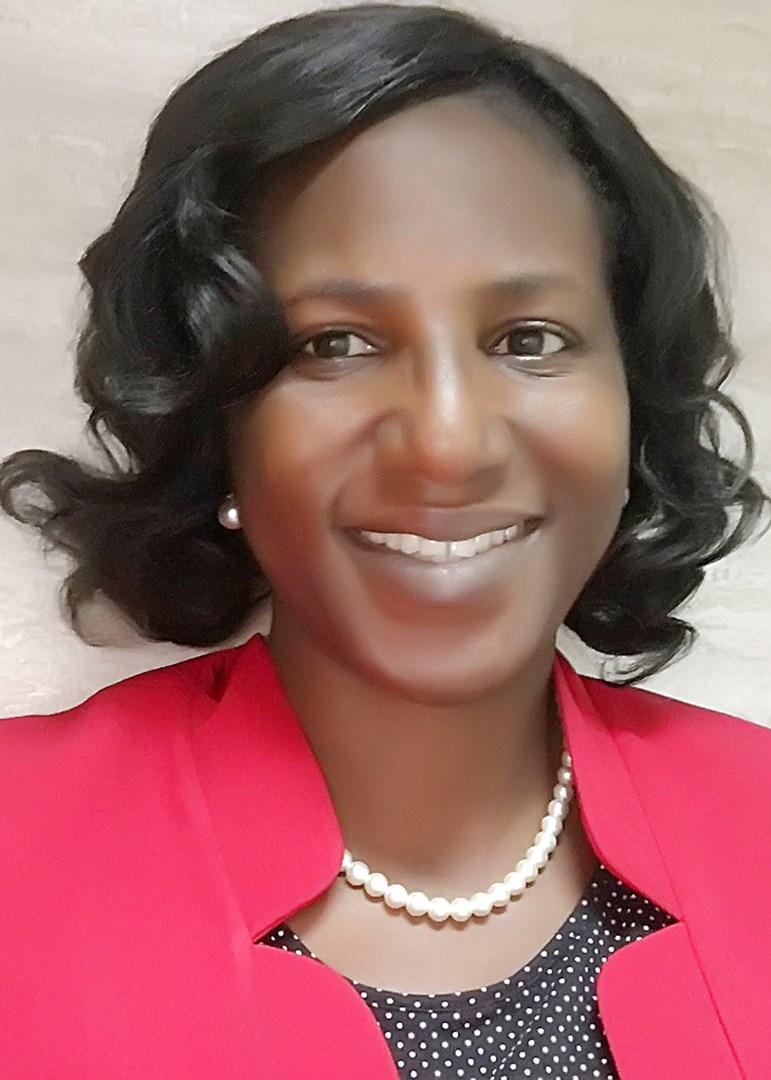
A QUARTERLY MAGAZINE
“Curb plastic pollution by limiting consumption, generating less waste, avoiding single use plastics and unnecessary plastic products. Support recycling schemes ‘If you can’t reuse it, refuse it’.”
R D S F
‘Let’sactnowtoendplasticpollution’
We appreciate every support over the years and your continued support and commitment that has made it possible for us to continue to provide succor to the less privileged in our society. We pray that God will bless you and grant you success in all your endeavors.

Donations:
You can make your donations online at: https://www.rehobothdreamsolidfoundation.org/donations
the rehoboth dream solid foundation board of trustees

Rear Admiral Oladeinde (‘Deinde) Olusoga Joseph was born at AraMoko, Ekiti State into the humble family of late Mr. Joseph Owolabi and late Mrs. Ajibabi Owolabi on the 9th of May 1948.
He enlisted into the Nigerian Navy in July 1967 and later graduated from the Nigerian Defence Academy Kaduna and was commissioned as a Sub-Lieutenant in July 1971 in India. He received professional training as a naval officer in India, United Kingdom and the United States of America. Rear Admiral Joseph is a graduate of the Nigeria Command and Staff College Jaji and the prestigious National Institute for Policy and Strategic Studies Kuru.
As a professional naval officer, he went through all the ranks in the Navy until he was promoted to the full Rear Admiral rank in 1998. While in the Navy, he had 4 sea commands, which included that of NNS Aradu (the Navy’s flag ship), 2 Training bases and 2 Operational bases. He had 2 tours at Jaji Staff College as Chief Instructor and Director of the Naval Faculty. He was also the Military Governor of Ogun State between 1990 and 1992. His last job was Chief of Navy Personnel at Naval Headquarters until he retired in June 1999.

Married to Mrs. Katherine Lolade Joseph since April 1975, Rear Admiral ‘Deinde Joseph is blessed with 3 children; Toyin (now Mrs. Borisade), and the boys Seyi and Jide, all University graduates. His hobbies are photography, reading and he is a handicap 9 golfer. A practicing Christian of Methodist Church of the Trinity, Tinubu since 1967, he has a passion to help the less privileged in the society. Rear Admiral Joseph is a recipient of the National Honour of the Commander of the Order Of the Niger (CON), and brings his experience and goodwill to the Foundation as the Chairman, Board of Trustees of the Rehoboth Dream Solid Foundation.
Ms. Ketumi Alasa studied Computer Science in the then Sheffield City Polytechnic now known as Hallam University, Sheffield, England. Worked in various capacities as an IT professional in leading multinational Oil and Gas, Insurance and Iron and Steel companies in Nigeria for 28 years cumulatively. After a successful and rewarding career in the corporate arena, she took an early retirement and launched out to fulfil her entrepreneurial dream in real estate and retail management. As a real estate entrepreneur, she has made remarkable progress in development and management of properties. On the retail front, she runs a chain of interior decoration shops.
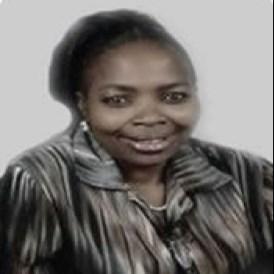
She is a practicing licensed Canadian Immigration Consultant and a certified Canadian Education Consultant and Foreign Student Recruiter for Canadian schools.
She is the CEO of Canada Outreach Immigration and Academic Consultancy, Managing Director of J-Three Sixteen Associates and Managing Director of Kay Kay Enterprise Interiors. She also serves on the Boards of a couple of christian and philanthropic organizations.
Blessed with five children, she enjoys playing the game of Golf. She served as a Lady Captain of IBB Golf and Country Club.
She is a Christian with a deep passion and commitment to supporting Missions work and the under privileged. Ms Ketumi Alasa is also a Trustee of the Rehoboth Dream Solid Foundation.
THINKING ALOUD ISSUE 22 | APR - JUN 2023 | 56
R D S F
Deacon Samson Madu Igbokwe is a 1983 B.Pharm Graduate of Pharmacy from the former University of Ife (Unife), now known as Obafemi Awolowo University (OAU). In addition, he gained a Masters in Business Administration Degree (MBA) from the University of Lagos (Unilag) in 2000. He also acquired a Certificate of Proficiency in Information Systems Management (CPISM).
Shortly after his Youth Service Corp at Military Hospital Lagos, he set up his own pharmacy business at S.W. Ikoyi, Lagos in 1985 which he has been running as Chairman/Managing Director till date. This is a company that supplies and distributes pharmaceuticals to its community and hospitals in Lagos State.

A devout and practicing Christian, he gave his life to Christ on March 31, 1991 in The Redeemed Evangelical Mission (TREM), Akoka. Since then, he has served in various capacities in TREM as House Fellowship Centre Leader, Zonal Leader, Assistant Area Co-coordinator and Financial Secretary/Treasurer of Caleb Group of the Christian Men Fellowship.
He is currently serving as the Chairman Hospital Visitation Ministry in TREM. He is a member of Pharmaceutical Society of Nigeria (PSN) and a Treasurer at Ikoyi Pharmacy Community Zone. He has passion for contributing to his community, and often assists in reaching out to orphans, the fatherless and widows in the community.
Periodically, he visits in a group and prays for the sick in hospitals in Lagos, ministering to their spiritual, physical and material needs. He is happily married to his amiable wife Mrs. Roseline Igbokwe and they have 5 children. Deacon Samson Igbokwe is a Trustee of the Rehoboth Dream Solid Foundation.
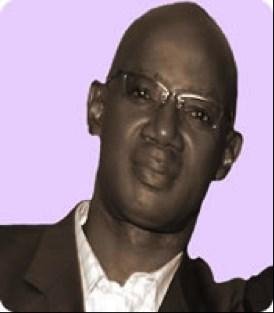
Deaconess Roseline Igbokwe was born on November 2, 1965 in Ikoyi, Lagos, and is married to Pharmacist Samson M. Igbokwe.
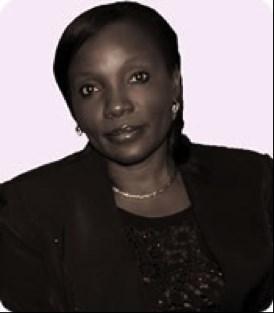
She is an alumna of Sikkim Manipal University (SMU), Gangtok, India and the University of Lagos (UNILAG); Bsc. in Applied Information Technology, Business Administration and Masters in Business Administration(MBA) from the same institution.
She holds a Certificate of Proficiency in Information Systems Management (CPISM), Advanced Diploma in Systems Engineering (ADSE), Certificate in Strategies for Managing and Collecting Data (LBS) and Certificate in Core Sales Skills (LCT). She worked with Texaco Nigeria Plc as well as Chevron Oil Nigeria Plc as Food Mart Supervisor, Senior Retail Business Consultant, South, and then MRS Oil Nigeria Plc as District Sales Manager, Southwest Nigeria, Credit Control Manager for Nigeria, Aviation Commercial, Retail Sales Manager for Southeast/Southwest Nigeria and Head, Sales & Marketing. Nigeria.
A hard worker with enthusiasm for excellence, in 2006 she won the ‘African Pakistan Global Downstream 2006 Cultural Award, of Customer Facing and Market Focused’ in Chevron, having executed superior and consistent execution and sales implementation of all programs, processes and systems. She had focused the department’s organization around achieving the best business financial targets through an agreed set of Profit & Loss control measures in all MRS Oil Nigeria Plc service stations in Nigeria.
She is an ordained minister with The Redeemed Evangelical Mission (TREM): and at various times has held the following positions: Assistant Secretary, Young Women Fellowship; Assistant Secretary, Christian Women Fellowship and Chairman Disciplinary Committee of the Evangel Voices Choir and Team Lead with the Christian Women Fellowship. Deaconess Roseline Igbokwe is also a Trustee of the Rehoboth Dream Solid Foundation. She is blessed with (5) five children.
57 | A QUARTERLY MAGAZINE
R D S F
Pastor (Dr.) Joshua Gbadebo Opadiya is the Senior Pastor of Every Nation Church Sydney, Australia, a worldwide family of churches and ministries. He is currently serving as the Hub Leader of the Oceania (Australia, New Zealand, Papa New Guinea and Fiji) overseeing the ‘Every Nation churches and ministries in the Oceania region.

Pastor (Dr.) Opadiya previously lectured in the Lagos State University, Nigeria for 6 years, before moving with his family to Innsbruck in Austria where he lived for almost 6 years. Thereafter, the family moved to Sydney Australia in 1999 where together with his wife, Dr. Mrs. Opadiya started the ‘Every Nation Church.
He received his bachelor’s and master’s degrees from the reputable University of Ibadan in Nigeria and holds a doctorate degree in Ecotoxicology from the Technical University, Innsbruck, Austria. Pastor (Dr.) Opadiya has a burden to raise godly leaders and see the nations return to Jesus Christ. He has travelled and ministered in several nations worldwide.
Pastor (Dr.) Opadiya's passion is to connect with young adults and adults alike who are leaders, peacemakers and bridge builders in their colleges, universities and in their communities. His life has been dedicated to this cause, reaching out, equipping, counseling and mentoring. He is also the dean of Every Nation Leadership Institute, a part-time program that is purposefully designed to provide discipleship training and biblical teaching for people from all walks of life. Pastor (Dr.) Opadiya and his wife have been married for 31 years. They are blessed with children. He is a Trustee of the Rehoboth Dream Solid Foundation.
Dr. (Mrs.) Yinka Opadiya is a senior pastor with Every Nation Churches and Ministries. Alongside her husband Pastor (Dr) Joshua Opadiya, she oversees the multi-congregational Church organization in Sydney, Australia – a church with members from diverse cultures, age groups and professions.
She is a teacher and motivational speaker with a passion for teaching about God's love and His purpose for humanity. She is also passionate about women and youth ministry; and is committed to mentoring women and young girls.
Her heart-cry is to see ‘the Church’ respond to the Great Commission of ‘making disciples’ and transforming nations. A graduate of the prestigious Universities of Ife and Ibadan in Nigeria, she also holds a Doctorate degree in French (Women Literature) from the University of Innsbruck in Austria. She had worked as a French Lecturer in the Lagos State University and in various schools in Sydney Australia. Dr. (Mrs.) Yinka Opadiya been married for 31 years. They are blessed with children. She is a Trustee of the Rehoboth Dream Solid Foundation.
Mrs. Ronke Osikoya holds a law degree (LLB) from the University of Lagos and an MBA (1988) from the same University. She is a Certified Trainer for the Commonwealth Association on Corporate Governance and has facilitated on the Directors course on Corporate Governance. She is a Management Consultant that co-runs a management consulting firm, Pedion Partnership Limited.
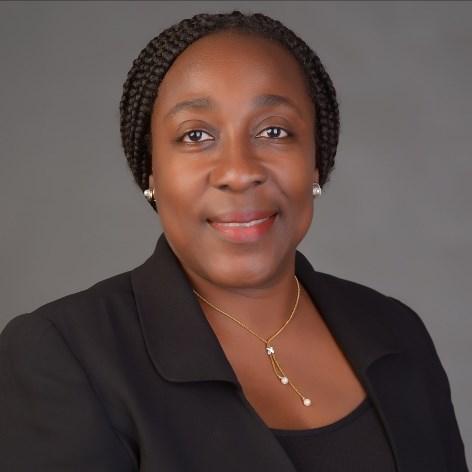
Her values are strongly shaped by her Christian faith and she believes very passionately in supporting the under-privileged, particularly children, which accounts for her involvement with the Foundation.

Mrs. Osikoya is a Trustee of the Rehoboth Dream Solid Foundation and lives with her husband and 2 sons in Lagos, Nigeria.

THINKING ALOUD ISSUE 22 | APR - JUN 2023 | 58
R D S F
Mrs. Abimbola Komolafe is a devout Christian who was ordained as a Deaconess of the Redeemed Christian Church of God (RCCG) in the year 2000 and as an Assistant Pastor in August 2013. She served as a Coordinator in the Teens ministry of the Resurrection Parish of the RCCG in Lagos where her passion for supporting the education of the less privileged was birthed .
She is a Chartered Accountant and Chartered Banker and is a Fellow of the Institute of Chartered Accountants of Nigeria (ICAN) and a Fellow of the Chartered Institute of Bankers of Nigeria. Mrs. Bimbo Komolafe has taken various management, Leadership and professional courses, within and outside Nigeria and is an Alumna of the Lagos Business School. She worked for 9 years in a reputable Merchant Bank in Nigeria and thereafter worked for 20 years with one of the leading Oil and Gas companies in Nigeria. She currently works as a Principal Consultant for Threshold of Trust Nigeria Limited.

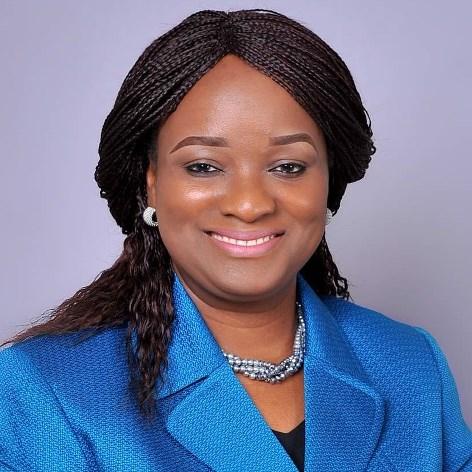
Married to Rear Admiral Kehinde Komolafe (Rtd) who is also an Ordained Pastor of the RCCG Nigeria, they are blessed with 3 children. Together with her husband, they are committed to providing financial support to as many less privileged students as they can accommodate. Mrs Bimbo Komolafe is the founder and Executive Secretary of the Rehoboth Dream Solid Foundation.
Rear Admiral Kehinde Komolafe (Rtd), is a highly revered and distinguished military officer who served meritoriously with impeccable records in the Nigerian Navy. He graduated from the Nigerian Defence Academy in 1980 and was commissioned as a Naval Officer a year after. Due to his quest for knowledge and passion for competence, he proceeded to study at the University of Nigeria, Nsukka where he graduated in 1985 with a B.Sc. Degree in Accountancy. He attended several courses nationally and overseas and witnessed consistent career growth during his active years in the military.

Rear Admiral Komolafe is a change agent with a commitment to providing transformational leadership and ensuring realignment of processes, operations, resource and people on various integrated fronts for optimum value creation. He held various sensitive positions in the Navy before his voluntarily retirement from the Service after 35 years of meritorious service. He presently sits on the Board of many prestigious organizations. Beyond his Military career, Rear Admiral Kehinde Komolafe (Rtd.) is a lover of God and a Pastor. He is married to Mrs. Abimbola Komolafe and they are blessed with 3 children.




Charity to the less priviledged Skills Acquisition programmes Raise funds for the needy







59 A QUARTERLY MAGAZINE
R D S F
Supporting the poor
















































































































































